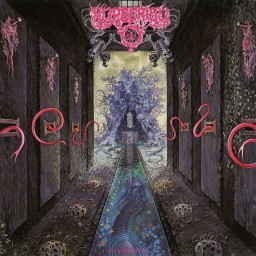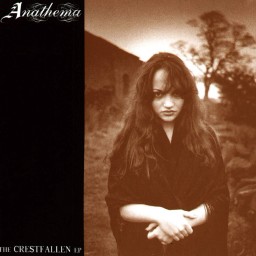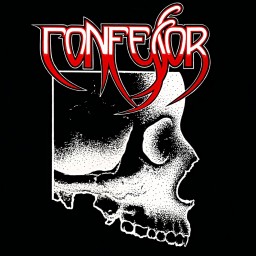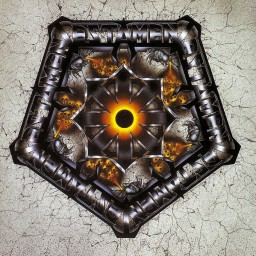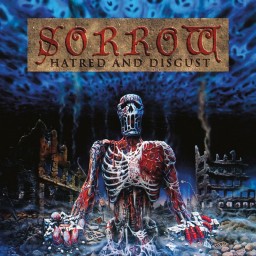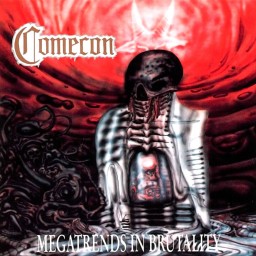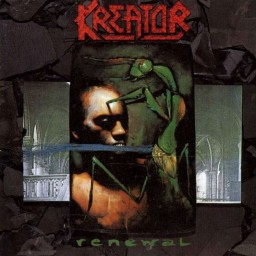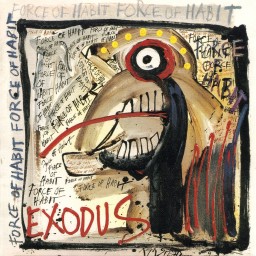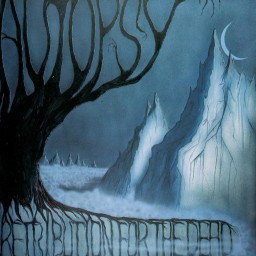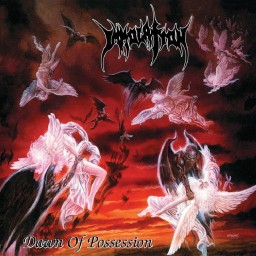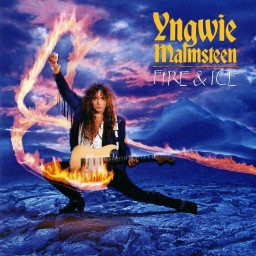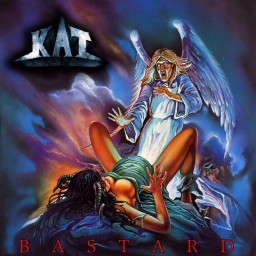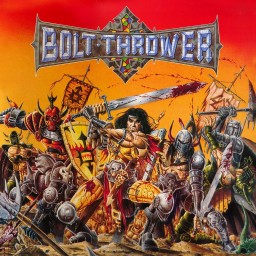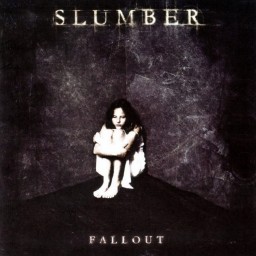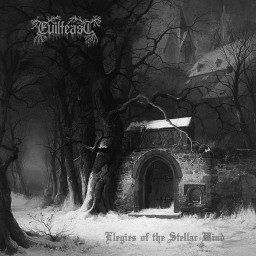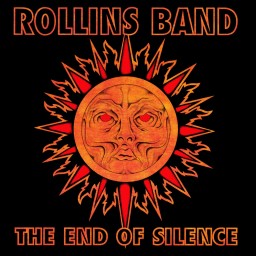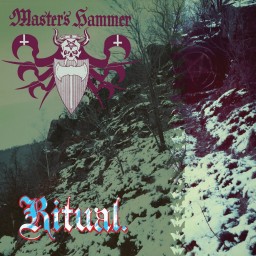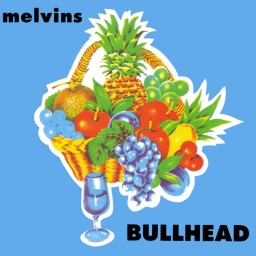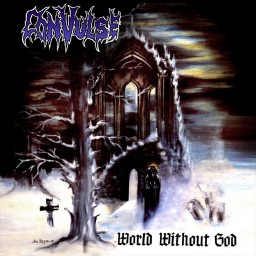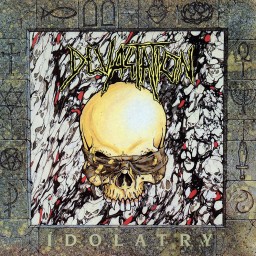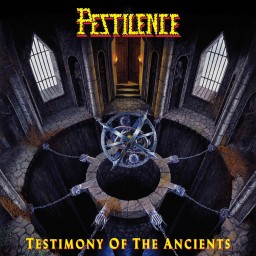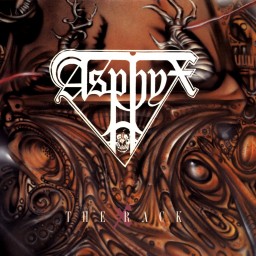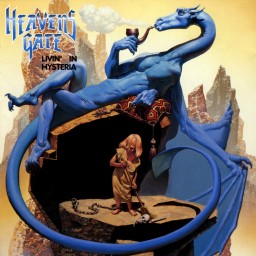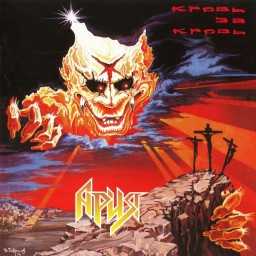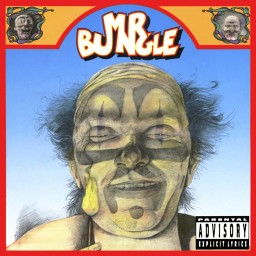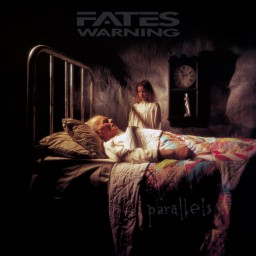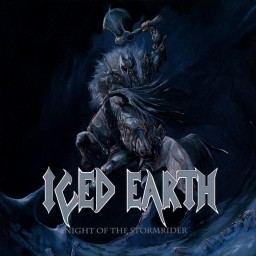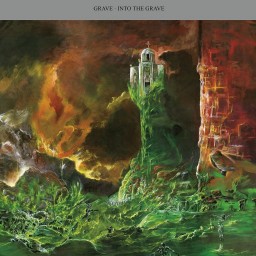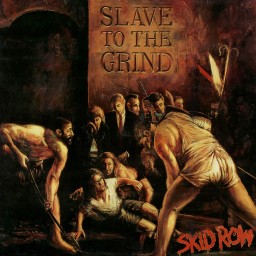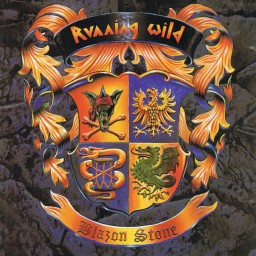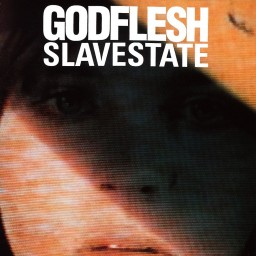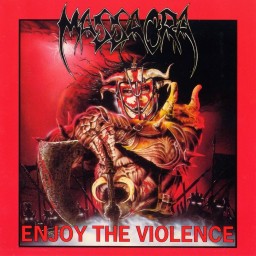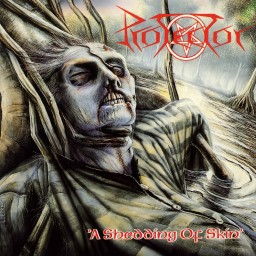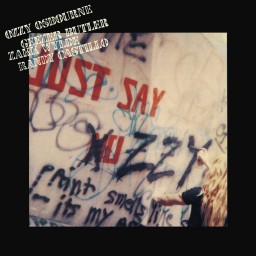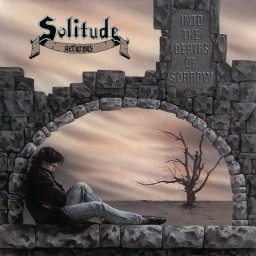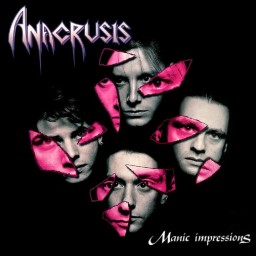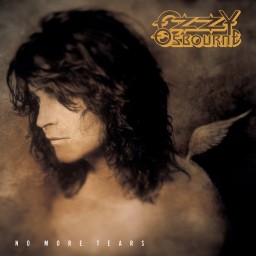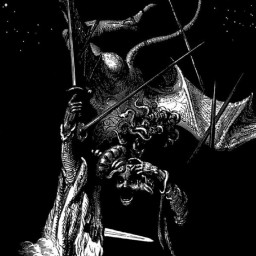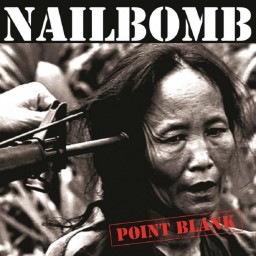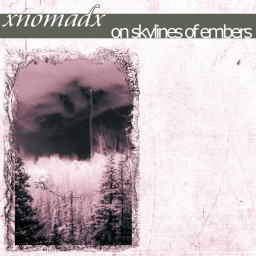Daniel's Reviews
Swedish extreme metal establishment Hypocrisy have generally built their reputation within the more melodic death metal circles over the years but some may not be aware that they originally began life as a more conventional death metal band back in the early 1990's. In fact, I still kinda think of them in more traditional terms if I'm being honest because we have a very long relationship. Hypocrisy & I first crossed paths when I noticed a cassette copy of their 1992 debut album "Penetralia" on one of my early visits to Neuropath vocalist Mark Wangmann's house in early 1993. I'd ask to borrow it so that I could make my own copy & it'd receive a fair few spins in my Walkman that year. Interestingly though, I never really thought of "Penetralia" as being anything too special, instead treating it as a fairly uneventful meat-&-potatoes death metal release that didn't bring anything new to the table but ticked many of my boxes from a sound point of view. For that reason, I haven't found myself returning to "Penetralia" since the 1990's but my recent period of nostalgia for that period has seen me tempted into a much overdue revisit.
Look, I certainly wasn't wrong with my assessment back in the day because "Penetralia" is every bit your standard early-90's death metal offering. Despite coming from the powerful Swedish scene of the time though, it doesn't take on the wall-of-noise production format that peers like Entombed & Dismember built their entire sounds on, even if there are many similarly structured riffs & punky one-two beats included. Here we find Hypocrisy taking an each-way bet with the US death metal model playing just as big a role in the outcome as their fellow countrymen which is not really all that surprising when you consider that multi-instrumentalist band leader Peter Tägtgren (Pain/Bloodbath/Lock Up/The Abyss/War) had spent a fair bit of time in the United States prior to forming Hypocrisy which was originally intended to be a solo project. "Penetralia" sees Tägtgren performing not only guitar but also all of the keyboards, most of the drums & some of the vocals so "Penetralia" would seem to be very much Peter's pet project. The drumming is admittedly very basic with the simple beats of Tägtgren & Lars Szöke (The Abyss/War) playing a purely supportive role & clearly pushing their limited technical abilities right to the brink of collapse although I do have to admit to enjoying the blast beats sections, despite the fact that they're not the most precise you'll find. The deep death growls of front man Masse Broberg (Dark Funeral/Witchery/Demonoid) are certainly very effective but are also pretty generic which only adds to Hypocrisy feeling more like an also-ran than a leader of the burgeoning young death metal scene.
"Penetralia" offers ten tracks across its 42-minute run time & begins in very solid fashion with two of the best few songs kicking off proceedings (see "Impotent God" & "Suffering Souls"). Unfortunately, the rest of the album doesn't manage to live up to that potential with only the more brutal "God Is A..." competing with those two early highlight cuts. That's not to say that there are all that many disasters along the way though with only a couple of flat tracks ("Jesus Fall" & "To Escape Is to Die") spoiling Hypocrisy's party. Deicide would appear to have been a pretty big influence on Tägtgren as you should be able to identify a number of riffs & beats that appear to have been borrowed from Florida's most notorious Satanists while the lyrics are clearly an attempt to emulate the sheer evil that Glen Benton & co. were able to muster on their 1990 self-titled debut album. Unfortunately for Hypocrisy though, their lyrical efforts come across as extremely immature in comparison & are possibly their most significant weakness when you consider that the vocals are generally pretty easily deciphered too.
There's no doubt that "Penetralia" was an acceptable release for the time & I doubt there would be too many genuine old-school death metal fans that would complain about it much after a blind purchase as it certainly ticks most of the required boxes. It just doesn't do that with a high-quality pen if you know what I mean with "Penetralia" coming across as decidedly third tier when compared to the wealth of classic releases the genre was dishing out to its rabid audience at the time. I have to admit that it does remind me quite a bit of the early Neuropath material though which is perhaps more of an indication that Tägtgren & I come from similar musical backgrounds than it is any indication of any sort of influence. If the idea of an early 90's US/Swedish death metal hybrid sees your ears pricking up then perhaps give "Penetralia" a few spins but I wouldn't expect anything too original or life-changing.
Genres: Death Metal
Format: Album
Year: 1992
Liverpool doom/death legends Anathema represent such a pivotal band in my life for many reasons. You see, no matter what style of music they've opted to pursue, the results of their endeavours inevitably manage to tear my heart-strings to shreds so they've played a significant role in my up-bringing & have gotten me through the hardest periods of my 48 years on this planet thus far. Ben & I were lucky enough to have discovered them very early on in their recording career too which has enabled us to follow them throughout their many decades of transformation & development. It feels more like a privilege than anything else at this point & while revisiting Anathema's first proper release this week I was reminded of just how talented these five 17-20 year-old musicians were even at such an early point in their careers.
Anathema of course make up one third of the infamous Peaceville Three alongside Paradise Lost & My Dying Bride, a group of English bands that were responsible for popularizing the still fairly young doom/death sound to a romantically & gothically inclined global metal audience. Anathema were by far the most sophisticated & musically talented of the three though & "The Crestfallen E.P." already highlights their creativity & ambition very clearly. The early Anathema sound was built on complex layers of interwoven guitar harmonies that appear on the surface to be entirely unique from each other but when brought together create a beautiful tapestry of melodic themes that perhaps have more in common with classical music than they do with metal. The fact that the song-writers were still so young when these songs were written is nothing short of mind-blowing when taking in a piece of the melodic complexity of the title track & I'm perennially left wondering how they even possessed the influences required to create material of such maturity.
Anathema's first proper release is also their most doomy & deathly record as its focus stays predominantly within the scope of the doom/death subgenre & remains free of the gothic, progressive & alternative influences that would see them taking a life-long journey of development & reinvention. "The Crestfallen E.P." is full of thick, chunky, riffs layered over lumbering rhythms & highlighted by transcendent melodic themes. The vocals of original front man Darren White are certainly an acquired taste but once you've accepted that he offers something a little different you should be able to appreciate the clear depiction of genuine sorrow & melancholy he is able to create with his voice. His delivery here is not as deathly as we received from him on Anathema's two demo tapes but it's still monstrous enough to keep the death metal crowd satisfied, even if he is generally regarded as the point of contention for Anathema fans that got onboard through their post-1995 releases. Personally, I feel that White's contribution is an essential part of the appeal of a record like this one as his layers of depressive lyrics are presented in a way that really does drag the listener down to a mournful state that's essential in understanding the appeal of early Anathema.
The tracklisting begins in stunning fashion with opener "...And I Lust" being one of Anathema's finest doom/death works. The E.P. also closes with the imposing "They Die" which was somewhat of a signature tune for the band's early period given that it was also the centrepiece of 1991's "All Faith Is Lost" demo tape as well as their 1993 debut album "Serenades". I hold these two tracks up as some of the most important extreme metal songs of my lifetime so it's really pretty hard to put their impact on me into words. The three songs in between are perhaps not as universally classic but still maintain a very solid level of quality with "The Sweet Suffering" possessing one of those eternally memorable melodic themes, the sweet, female-fronted folk piece "Everwake" giving the listener a well-earnt break from the emotional battering they've received from the opening two tracks & the sheer melodic complexity of the 10+ minute title track being nothing to sneer at.
While "The Crestfallen E.P." may not be Anathema's best record, I still think it deserves to at least be in the conversation. As with "Serenades", it's too often down-rated by Anathema's later audience which has seen it being unfairly overlooked by its prospective fanbase at times. There's no doubt that it was a step up from the two demo tapes that preceded it & it set a marvelous platform for the two classic doom/death albums that would follow it over the next three years. Personally, I still rate "Serenades" as the peak of that era of the band, closely followed by the more gothically inclined "The Silent Enigma". But "The Crestfallen E.P." follows very closely behind those two for mine & deservedly owns a position in my Top Ten Death Doom Metal Releases of All Time list. If you're a devotee of the classic era of this subgenre & worship the early-to-mid 1990's releases from bands like Katatonia, Paradise Lost & My Dying Bride then this record should be regarded as essential listening.
P.S. Please be aware that the Spotify version of "The Crestfallen E.P." inexplicably contains demo versions of the title track & "They Die" in place of the versions I have on my CD copy & this most certainly degrades the overall product.
Genres: Doom Metal
Format: EP
Year: 1992
I'd honestly never heard of North Carolina five-piece Confessor until I picked up 1992's Earache Records "Gods of Grind" compilation back at the time of release. The CD brought together high-quality EP's from Entombed, Carcass & Cathedral as well as the three-song self-titled effort from Confessor which featured the title track from their 1991 debut album "Condemned" as well as two cover versions of old Trouble songs that I probably wasn't aware of at the time. I think it's fair to say that Confessor's contributions saw my ears pricking up in a pretty major way too just quietly because they offered a very fresh & professional sound that not only showcased their clear technical talents but also saw them presenting something a little different to the norm.
If there's one reason to check out the "Confessor" E.P. then it's most certainly the opening cut "Condemned" which is a real treat for fans of the more complex side of progressive metal. The rhythmic experimentation on show here is nothing short of marvelous & will have even the more capable drummers out there picking their jaws up off the ground. Scott Jeffreys soaring higher-register vocal histrionics are certainly an acquired taste but shouldn't be too much of a challenge for prog fans who have been raised on a steady diet of Watchtower & Fates Warning. Things change up significantly for the second song "The Last Judgement" (an old Trouble demo track) which sees Confessor taking a different approach that sits somewhere between traditional doom metal & stoner metal. It's still solid enough stuff though. Closer "Endtime" was one of my favourite inclusions on Trouble's debut album "Psalm 9" so there's no surprise that I enjoy Confessor's version too. It kinda combines the three sounds we've heard over the first two tracks for a high-quality progressive stoner doom instrumental.
There's no question that "Confessor" is carried by the single original inclusion in "Condemned" but the two cover versions are both excellent too which has seen me being tempted to award one of my more premium scores. I've never gotten around to checking out much of Confessor's other material but it might be about time I did. The "Confessor" E.P. comes highly recommended for fans of Abstrakt Algebra, Dark Millenium & (unsurprisingly) Trouble.
Genres: Doom Metal Progressive Metal Stoner Metal
Format: EP
Year: 1992
By 1992, Ben & I had been fans of Californian thrash metallers Testament for a good few years & were very familiar with their entire back catalogue. I found their trio of 1980's albums to be very solid thrash records indeed but, despite it still being reasonably enjoyable, I hadn't found 1990's "Souls of Black" to be quite as engaging. For that reason, I was a little cautious about racing out & buying Testament's "The Ritual" album upon release. There was an easy fix that would represent somewhat of an each-way bet for me though & I chose to act on it by purchasing the CD for Ben for his birthday & ripping it to cassette a good week before Ben had even received his present. What a great brother I am! By the time Ben received his present I was already well across "The Ritual" & didn't even try to hide it, the smug fucker that I was at the time (& arguably still are). Anyway... I'd suggest that my initial impressions of "The Ritual" kinda validated my cautiousness so let's spend a bit of time examining why.
The early 90's was a tough time to be a thrash metal band in the wake of the grunge & groove metal explosions. Where Testament's first four albums were predominantly thrash metal releases, "The Ritual" saw Testament taking a popular approach for thrashers in a post-"The Black Album" market by diluting their sound for greater accessibility, the result seeing the first half of the album sounding much more like Ozzy Osbourne or Metallica's infamous self-titled album than it does genuine thrash. Things get a little heavier across the B side but there's no question that this was Testament's least heavy record to the time. The other major talking point (at least for me personally) is Tony Platt's production job which leaves a lot to be desired in my opinion. The most important component of any Testament release must surely be the guitars but here was see the riffs being smothered in the mix which sees them lacking the potency they deserve & this has clearly had a detrimental impact on the overall effectiveness of the album.
Thankfully, the song-writing isn't too bad with only the flat opener "Electric Crown" (seriously, why is this the most popular track on the album people?) & clunky thrasher "The Sermon" failing to see me entertained. As was the case with the last couple of Testament albums which both included a ballad, "The Ritual" actually presents us with two decent ones in the very solid title track (one of my album highlights) & the reasonably pleasant "Return to Serenity". The other album high points come from energetic heavy metal number "So Many Lies" (with its mind-blowingly superlative guitar solo) & the most thrashy number on the record in "Agony". There really isn't a classic metal tune to be found here though & I'd suggest that Chuck Billy's inability to stay in tune while attempting to sing over a more accessible sound doesn't help in that regard. He's always been overrated in my opinion & "The Ritual" is a pretty good example of why.
As with most Testament albums, there's an argument for listening to "The Ritual" purely for lead guitarist Alex Skolnick's stunning solos but there's probably enough interesting material to justify a few listens anyway. I can't say that I regard it as being an essential Testament release though. I'd suggest that I find it marginally more enjoyable than "Souls of Black" but there's not a lot in it to be honest. They're both merely acceptable more than they are impressive as far as I'm concerned but I can see "The Ritual" offering the most appeal to fans of post-2000 Megadeth, "Kin"-period Xentrix & the more accessible Death Angel albums like "Act III" & "The Art Of Dying".
Genres: Heavy Metal Thrash Metal
Format: Album
Year: 1992
New York four-piece Sorrow are an act that was first brought to my attention back in my 1990's tape trading days with their debut album "Hatred & Disgust" entering & exiting from my life relatively quickly. I didn't find a lot to grab onto as far as I can remember so I don't recall giving Sorrow a lot of time before placing them firmly into the "none of my business" basket. My recent explorations of my youth have seen me wondering if I might have been a little harsh on "Hatred & Disgust" though, particularly given the points of comparison that are most regularly raised when discussing the album, so I decided to give it another chance this week & boy am I glad that I did too.
I'd describe the sound that Sorrow go for on "Hatred & Disgust" as a particularly doomy example of the old-school death metal model with the production possessing that classic graveyard feel. The album is often tagged as doom/death which isn't all that far off the mark but I feel that this is a little too strong in the death metal component to warrant dual primaries. The musicianship is fairly primitive but Sorrow's sound is well-defined & maximizes the limited skill sets of the individual contributors quite nicely. The lead guitar work of Billy Rogan & Brett Clarin is probably the only area that I'd criticize with their solos generally representing the weaker moments on the album. It's the vocals of bassist Andy Marchione that are the main focal point though with his tone sitting somewhere between a less powerful "Blessed Are The Sick"-era Dave Vincent (Morbid Angel) & the whispery delivery of Revenant's Henry Veggian. Marchione's phrasing & accent is heavily influenced by Death's Chuck Schuldiner though & you can also pickup the impact of that band in some of the tremolo-picked riffs & more complex rhythms on "Hatred & Disgust".
The tracklisting kicks off beautifully with doom/death opener "Insatiable" being the clear highlight & the only genuine classic of the six cuts on offer. Death metal stomper "Forced Repression" & epic closer "Unjustified Reluctance" are also very strong & provide great support. "Separative Adjectives" is a bit disappointing but it's not enough to taint what I've found to be a thoroughly rewarding forty-minute death metal experience that fans of Cianide, Cruciform & early Paradise Lost should consider to be required listening. I honestly have no fucking idea why I couldn't see the appeal in this stuff back in the day & would have to suggest that "Hatred & Disgust" is one of the more underrated releases from death metal's heyday.
Genres: Death Metal Doom Metal
Format: Album
Year: 1992
I first came across Swedish death metallers Comecon at Neuropath vocalist Mark Wangmann's house way back in 1993 when I noticed a cassette copy of their debut album "Megatrends in Brutality" sitting on his bedroom side table. Upon questioning him about it I was advised that the album featured Entombed/Nihilist/Firespawn/Morbid legend L-G Petrov behind the microphone which tweaked my interest & I ended up borrowing the tape so that I could create a dubbed copy for myself. Upon getting home & whacking it into my tape deck I found that Comecon offered a crust punk-infused brand of death metal that was built around the guitars of band leaders Pelle Ström (also of Swedish thrashers Agony) & Rasmus Ekman with the drums appearing to have been programmed. It sounded OK but wasn't something that offered me a lot of long-term appeal so it didn't receive too many return visits after the first few days. We're now over thirty years down the track & I just noticed that the "Megatrends in Brutality" is still yet to receive a rating at the Academy so I've committed to breaking that drought with my first revisit since I was just a teenager.
The production job on "Megatrends in Brutality" isn't too bad which gives the riffs enough weight to offer full value for money. I will say that the drum machine sounds come across as pretty clicky & primitive though which does detract from the enjoyment a bit, particularly given that the programming itself isn't exactly the most sophisticated you'll find with fills & rolls being kept fairly minimal. Blast beats are utilized sporadically across the tracklisting & usually match up with the more hardcore influenced riffs of which there are plenty on offer, so much so that I feel that the album is deserving of a dual tag with deathgrind. I can't say that I've ever thought that Petrov's vocal delivery was anything particularly special but he does a reasonable job here without ever really threatening to create anything worthy of a highlight reel.
The tracklisting begins quite well with three of the stronger inclusions kicking off proceedings before things start to go down hill through the middle of the album. There are a couple of decent numbers towards the back end of the record (particularly album highlight "Omnivorous Excess") but it's not quite enough to save "Megatrends in Brutality" from the abyss as it simply doesn't deliver consistently enough to be worthy of a mention in a period when death metal was at its absolute peak, both creatively & commercially. There's nothing too awful included but one feels that if not for Petrov's contribution then Comecon would likely not have registered the slightest blip on the extreme metal radar. As a result, I'd suggest that "Megatrends in Brutality" is for Entombed superfans only.
Genres: Death Metal Grindcore
Format: Album
Year: 1992
Much like Exodus' notorious "Force of Habit" album that I reviewed last week, Teutonic thrash metal heavyweights Kreator's sixth album "Renewal" is widely regarded as the releases that signaled the end of the band's classic period. It saw Kreator going for a fresh new sound & taking creative risks but the public seemed to shun any notion of their German heroes morphing into anything other than the band they grew up with & "Renewal" bombed pretty hard. I was just sixteen years old at the time though & lived in Sydney, Australia where I was somewhat sheltered from the wider global reception. I'd been a HUGE Kreator fan for a good three years by that stage & "Renewal" would be the second of their albums that I'd pickup at the time of release. I went into it with extremely high expectations but, although there's no doubt that "Renewal" was different to what I expected, I was open to following the band down whatever musical rabbit-hole they'd take me on. I don't recall the album being as divisive amongst the local metal community I was a part of at the time either, potentially because we were younger & less inclined to want our metal pigeon-holed into specific genres. It's been a few years since I've heard "Renewal" now so I thought I'd find out if my feelings of nostalgia were still strong enough to see the album holding up in 2024.
"Renewal" sees Kreator taking several bold moves away from the vicious thrash metal attack of the past. For starters, we see them utilizing down-tuning for the first time which was always gonna give them a different feel. The riffs are much simpler too with a stronger focus being placed on building a cold atmosphere than ripping the listeners face off. There's certainly an industrial component to a couple of the tracks but it's not as significant as some critics will have you believe. The elements of groove metal are more noticeable though as we find many of the riffs veering away from thrash altogether & taking a chunkier & more rhythmic approach. Front man Mille Petrozza's vocal delivery is very serious as he barks & spits out social commentary in a fashion that deviates from his traditional raspy tone. I'm not sure I like it as much but it does feel like he's finally grown up a little bit which is possibly something that can be said of the band as a whole as everything sounds more measured & controlled. Possibly the only element that suffers noticeably from the new approach is the guitar solos which are as theoretically incorrect as ever but sound much more incompetent in their newly exposed surroundings.
"Renewal" certainly isn't as immediate as past Kreator albums & takes a few listens to really dig its talons in. It's a darker record than we've seen from Kreator in the past with several parts even feeling doomy. There are no weak songs included in the consistent tracklisting & I ironically find the most popular number "Renewal" to be the least effective piece these days, even though (& perhaps even because) it was the very first song my old death metal band Neuropath covered back in 1993. There aren't many genuine highlight tracks though either & I feel that this fact has been instrumental in the general feeling that "Renewal" is a creative failure which is a very harsh viewpoint in my opinion. The wonderfully doomy "Karmic Wheel" is by far my favourite piece of the nine on offer & has always been an anthem for my early 90's youth.
Look, "Renewal" no doubt presents a very different Kreator to the one we'd known & loved up until that point but it was never intended to be "Coma of Souls Part II" & this is obvious in its title which should have provided a hint as to Kreator's intent. There are still plenty of thrashtastic moments for those that require them but there's also a greater focus on song-writing & a stronger social message than the past which is simply the result of the band maturing & striving for relevance in a changing musical environment. I liken "Renewal" to Sepultura's "Chaos AD" album in many ways & wouldn't be at all surprised if it had been an influence as you'll find many of the same adjustments have been made, although the Brazilian's 1993 fifth album would be infinitely more popular for one reason or another. Regardless of that, I think people are missing out on a really strong Kreator record here, mainly due to the universal impatience that sees a large portion of the listening public only giving a record a listen or two before forming their opinions on it. For me personally though, I'd take "Renewal" over a few of Kreator's more widely celebrated releases like the "Out of the Dark... Into the Light" E.P., their debut album "Endless Pain" & even their highly acclaimed third album "Terrible Certainty" these days.
Genres: Thrash Metal
Format: Album
Year: 1992
By 1992 I'd already been an Exodus fan for a good few years & had enjoyed everything they'd done to the time (with the exception of their primitive 1982 demo tape). Their 1985 debut album "Bonded By Blood" is unquestionably one of the greatest examples of the thrash metal sound & is still an all-timer for me while the two records that followed it ("Pleasures of the Flesh" & "Fabulous Disaster") were both very solid releases indeed. 1990's "Impact is Imminent" had seen many fans jumping off the train but I honestly think it's been harshly treated over the years as it wasn't too bad in my opinion. I mean, it was certainly a step down from the first three records but I still got a fair bit of enjoyment out of it, even if it may not be a release that I regard as essential when exploring the Exodus' back-catalogue. 1992 would see things getting a lot worse for Exodus though with the their fifth album "Force of Habit" bombing in a major way & triggering claims of selling out to the new Pantera groove metal sound. Ben & I picked the album up upon release (on cassette from memory) & I recall us both being pretty disappointed with it. I couldn't exactly recall why when I attempted to draw upon those brain cells recently so I thought I'd give it another chance with a fresh & open mind.
Let me be clear about one thing straight up, "Force of Habit" is a hugely self-indulgent record. It's run time has been stretched out to a ridiculous 68 minutes with a few of the thirteen songs exceeding the duration they should naturally expire at by a considerable margin. We'd started to see Exodus making longer songs for a couple of albums now & it was something that I thought I'd keep an eye on as it didn't always sit comfortably with me but here it can be a little grating. The other major change of note is the stylistic variety on offer with Exodus now including a good half a record (well... a whole record for most bands) of material that wasn't strictly thrash metal. While I do think the calls to tag "Force of Habit" as a groove metal record are extreme given that the few tracks that take that direction don't amount to even 20% of the album, there can be no doubt that their experiments with the newly popular genre were a creative failure as songs like the title track & "Climb Before the Fall" are nothing short of awful. They're actually not all that bad from a purely instrumental point of view but Steve Souza's vocals performances sound completely at sea over the top of this material. He's absolutely phoned in some of these efforts in & I wouldn't be surprised if his poor contribution here had played a role in Exodus going into a twelve-year hiatus following this record because he really is that bad at times & that's coming from someone that's generally a big fan of him too. Another interesting talking point is the inclusion of a few tracks that reside more in the heavy metal camp than they do a thrash or groove metal one & the results aren't too bad actually with some of the better tracks on the album falling into this space.
Unfortunately, the tracklisting is massively inconsistent with none of the thirteen songs achieving classic status. Down-tempo heavy metal chugger "One Foot In The Grave", thrashtastic closer "Feeding Time At The Zoo" & the eleven-minute US power metal epic "Architect of Pain" (my personal favourite) are all classy efforts that are worthy of inclusion on any of the Souza-fronted albums while "Me, Myself & I", "Fuel For The Fire", "When It Rains It Pours" & "Good Day To Die" all offer enough to keep me interested. In fact, there's enough quality material included here to have made for a solid four-star, forty-minute record that would have surpassed some of Exodus' also-ran releases like "Impact Is Imminent" & "Tempo of the Damned" for overall consistency. Why must Exodus insist on including sub-par cover versions on their albums though with The Rolling Stones' "Bitch" or Elvis Costello's "Pump It Up" having nothing of interest to say? It's frustrating to say the least & I can't imagine how Gary Holt must have felt when listening to the final result because there are some ripping guitar solos on this record but they're partially nullified by poor creative decisions & below-par song-writing. It's no wonder I put "Force of Habit" aside & didn't return to it until now. Thankfully "Architect of Pain" takes up a fair chunk of the run time which sees my rating staying closer to a respectible mark than is probably warranted but a three-star rating is still well below expectations for one of the biggest names in thrash metal.
Genres: Thrash Metal
Format: Album
Year: 1992
I first became acquainted with legendary California death metallers Autopsy through their 1989 debut album "Severed Survival" after hearing some of the more popular songs on late-night metal radio programming in the very early 1990's. I was madly indulging in anything I could find in the way of death metal at the time which saw me seeking out a dubbed copy of the album shortly afterwards but if I'm being completely honest I'd have to suggest that I never quite understood the novelty that led to "Severed Survival" being held up on such a pedestal by most death metal fans. I certainly got enjoyment out of it but found it to be far from the classic it was so often touted as. However, it wouldn't take me all that long to get on the Autopsy train with 1991 spawning my two favourite Autopsy releases in the "Retribution For The Dead" E.P. & their career-defining sophomore album "Mental Funeral" which is still my pick of the bunch. "Mental Funeral" is deservedly the record that most people talk about when referring to Autopsy's legacy but I've always felt that "Retribution For The Dead" served as a great indulgence into a particular element of Autopsy's sound & it's about time that I explored it in a more critical manner so that I can submit a well-informed Metal Academy rating.
"Severed Survival" was very much the prototype for filthy, gore-soaked death metal that didn't take itself too seriously & valued atmosphere & imagery over precision musicality but "Retribution For The Dead" was something altogether different in that it took the doomier elements that were hinted at on the debut & made them the focal point of the three-song affair, so much so in fact that it's left me questioning whether there's even any reason to have the E.P. attached to the death metal genre at all given that it so clearly seems to fit in with the definition of the doom/death one that resides solely in The Fallen. Autopsy have always been at their best when they're at their doomiest so this approach was welcomed with open arms by this particular death metal nut. The up-tempo one-two beats still pop up on occasion but they're kept to a minimum this time which suits me down to the ground.
The production job is interesting here & would be a defining component of both of Autopsy's excellent 1991 releases. The guitar tone has had a little distortion sliced off the top which gives things a completely different feel to most death metal. It's somehow more twisted & repulsive which is kinda genius if you think about it because I wouldn't have guessed that would be the result of such a venture. The song structures are also pretty loose & veer well away from the traditional verse-chorus concept with an anything-goes type of arrangement being adopted instead. The vocals of drummer Chris Reifert (Static Abyss/Abscess/Death/The Ravenous) can tend to cross the line into pure silliness at times which has been a common observation over the years but that's kinda in line with Autopsy's whole tongue-in-cheek image & mentality so can be forgiven for the most part.
The opening title track is mildly entertaining but is clearly the weaker of the three tracks on offer with the two songs that would later appear in a re-recorded format on "Mental Funeral" (i.e. "Destined To Fester" & "In The Grip Of Winter") being the more impressive examples of the early 90's Autopsy sound. I definitely prefer the album version of "In Tne Grip Of Winter" but that's not too much of a criticism as "Retribution For The Dead" had already left its mark on me by the time I purchased "Mental Funeral" on cassette shortly after its release & a couple of months after the E.P. hit the shelves. If you're a big Autopsy fan then you owe it to yourself to explore this record as it's deserving of its place amongst the band's finest works while Asphyx, Winter & Coffins fans should also be placing it in their to-do lists.
Genres: Death Metal Doom Metal
Format: EP
Year: 1991
The debut album from these New York death metal legends would not only represent my introduction to the band but would also be a pretty big record for me at the time, particularly given that this was the period when death metal was completely taking over my life. That dark & dense Immolation sound is already well in effect here with the most notable component being the unusual rhythmic complexity that I've always found to be very exciting. The performances aren't super-precise but then that was never really Immolation's bag, instead going for a swampier sound that benefits from a bit of looseness in the musicianship. The drumming has always been Immolation's weak spot but here we see Craig Smilowski (Disma/Goreaphobia) putting in much better performance than we'd hear from later Immolation drummers & arguably being the MVP from an instrumental point of view. There's a truckload of Morbid Angel influence on display here which can only be a good thing, particularly when combined with bass player Ross Dolan's monstrously devastating death growls which are some of my favourite in the entire genre. I'm often reminded of Incantation & Gorguts' debut album "Considered Dead" in the way Immolation go about their craft too.
So, if all of the ingredients are here for an elite death metal experience then why haven't I scored "Dawn of Possession" any higher than I have? Well, it comes down to consistency. The A side is most certainly pretty classic, particularly the three-track run of "Despondent Souls" into the title track into "Those Left Behind" which is the album highlight & one of Immolation's very finest works. However, the B side simply offers a very solid run of death metal tracks without any genuine classics amongst the five songs on offer. In saying that, I do regard "Dawn of Possession" more highly than some of the band's more widely celebrated releases like "Here In After" & "Unholy Cult" & it's still my second favourite Immolation release behind the magnificent "Close To A World Below" which is a top five death metal record for me overall. I can't see too many fans of the classic death metal sound not getting some seriously jollies out of this album to be honest as it simply ticks all of the boxes.
Genres: Death Metal
Format: Album
Year: 1991
I just wrote a full review of this album & then accidently deleted it so I'm not gonna go through the lengthy process again. Let's just say that "Fire & Ice" is an underrated release that saw Yngwie returning to some level of form after 1990's disappointing "Eclipse" album. The clear highlights are the two wonderful neoclassical metal instrumentals "Perpetual" & "Leviathan" which manage to balance out the three or four duds amongst the fourteen song tracklisting very well. In fact, I'd go so far as to say that Yngwie well & truly puts competitors like Cacophony, Jason Becker & Michael Angelo Batio back in their boxes with those because no one can touch him when he decides to get his dark & exotic leather pants on & these two tracks are the absolute peak of the niche genre for mine.
The album jumps around quite a bit stylistically which keeps you on your toes with hard rock, heavy metal, power metal & even glam metal, classical music & symphonic metal getting the odd airing. The semi-regular use of bridges that go full-throttle down a cheesy classical music hole is something I could do without but the more sporadic use of keyboard solos & the wonderfully capable vocals of Göran Edman (Madison/Time Requiem/Vinnie Vincent Invasion) certainly do no harm whatsoever. Was Yngwie simply repeating himself by this stage? Yeah, there's no doubt that he was but I'd actually take "Fire & Ice" over 1986's much more popular "Trilogy" album if I'm being honest so it's far from the misfire people seem to claim it to be these days.
Genres: Heavy Metal Neoclassical Metal
Format: Album
Year: 1992
I believe that I first came across Poland's KAT when a European tape trader sent me their highly regarded 1988 third album "Oddech wymarłych światów" back in the early 1990's, a release that I quite enjoyed & which led me to explore their 1992 "Bastard" album shortly afterwards. "Oddech wymarłych światów" had seen KAT moving away from their heavy/roots metal roots towards a thrash metal sound that was more in line with my musical preferences but it just lacked the consistent quality in the riffs & those couple of genuine highlight tracks that would take it from being a pleasant one-off experience to a more engaging one worthy of multiple revisits. "Bastard" would see KAT taking their sound to the next level & shows clear evidence that the four-year gap between albums had not been wasted. You see, "Bastard" is much more than your standard early 1990's thrash metal release. It's a complex & expansive beast of a technical/progressive thrash record that takes risks & subsequently offers greater rewards than it's more widely acclaimed predecessor. That's not to say that "Bastard" doesn't have it's flaws though because it certainly does.
The production job isn't amazing with the rhythm guitar tone being a little flat & overly dry but the main detractor is the dodgy Polish vocals of Roman Kostrzewski which don't seem to fit as comfortably over the more technically inclined brand of thrash that KAT were dishing out at the time. I would definitely have preferred a more classically capable singer here to tell you the truth. Thankfully though, the instrumentation is pretty wonderful & offers more than enough in the way of mind-bending rhythmic gymnastics to keep this ol' trasher interested throughout a blemish-free tracklisting.
As with "Oddech wymarłych światów", I wouldn't suggest that there are any genuine classics amongst this lot though. My issues with the vocals goes a long way to ensuring that but there is some good variation in style included to keep the listener on their toes. With the exception of the more straight-forward title track, the first half of the album generally indulges in a challenging technical/progressive thrash sound but KAT change things up a bit in the middle of the record with a two-minute instrumental neoclassical metal piece called "N.D.C." which is very effective in showcasing the flashy sweep-picking skills of guitarists Piotr Luczyk & Jacek Regulski. The tracklisting is also closed out by "Łza dla cieniów minionych" which I could only suggest was an early example of gothic metal & is a far cry from the aggressive tech thrash of the rest of the album. It doesn't seem out of place or jarring though which is a credit to KAT's creative vision & ability to execute in a fluent fashion.
I have to say that it's kinda strange that no one seems to mention "Bastard" when talking about the better examples of the technical/progressive thrash sound as it's emphatic in its statement in that regard. In fact, I'd suggest that it's one of the best examples of that style I've experienced to be honest which is really saying something. KAT are generally compared with bands like Venom, Sodom & fellow Poles Turbo but "Bastard" sits much more comfortably alongside artists like Аспид & Obliveon as well as the more technical Annihilator material in my opinion & if those acts bring a spring to your step then it's a safe bet that "Bastard" will too as long as you can handle the Polish language vocal delivery. It's certainly a step up in class from "Oddech wymarłych światów" in my opinion & is probably the best of the six KAT releases I've heard over the years.
Genres: Thrash Metal
Format: Album
Year: 1992
English death metal establishment Bolt Thrower quickly became a key player in my youth after I discovered their 1989 sophomore album "Realm of Chaos" through late-night underground metal radio programming during the very early 1990s. Tracks like "World Eater", "Eternal War" & "All The Remains" received regular air-time during that period & I was instantly attracted to their dark, war-worshipping tone. I'd subsequently purchase the album on cassette & it's a record that I still think of with fond memories to this day although I wouldn't say that I've ever regarded it as a classic. It would certainly impress me enough for me to not only explore Bolt Thrower's 1987 "Concession of Pain" demo tape, 1988 "Peel Sessions" recordings & debut album "In Battle There Is No Law!" (the latter two of which I enjoyed) but also to race out & purchase their 1991 third album "War Master" upon release. I'd already been given a taster a month earlier through the "Cenotaph" E.P. which was centered around arguably the best track from the album so I was well up for what was in store for me by the time the full-length CD hit my player. "War Master" would receive many listens from me that year & has commanded regular revisits ever since but, despite it being held up as a genuine death metal classic by many death metal fans, I've never seen it as the equal of the two albums that followed it which is where my Bolt Thrower sweet spot is. It's time I gave "War Master" the time to find out why that is.
"War Master" would very much represent the next step in Bolt Thrower's evolution following two full-lengths that still maintained an element of dirt & grit. It would see the band cleaning up their sound a bit & going for a more professionally presented death metal package that placed a higher value on production & precision. The grindcore component that was still quite evident on "Realm of Chaos" is considerably less prominent on "War Master" which is focused on a slightly more melodic death metal sound with blast-beats being used less regularly. You can still hear elements of the thrash metal influence that was evident in their early works in the guitar solo sections which are pretty clearly inspired by the Kerry King/Jeff Hannemann model. Despite that though, "War Master" would be the record that would define the classic Bolt Thrower sound & style, a model that they'd rarely veer away from for too long over the course of their five subsequent albums.
The glossy album cover is a pretty good representation of where Bolt Thrower were at in their musical evolution too actually. It's brighter & more colourful than the "Realm of Chaos" artwork was, even though they're built around similar "Warhammer" role-playing-game inspired themes. The performances of the five individuals seem more controlled & restrained with a stronger focus on cohesion & precision than sheer extremity. Jo Bench's immense bass tone plays a key role in allowing guitarists Gavin Ward & Barry Thompson the room to explore increasingly more melodic riff structures without losing anything in the way of bottom end. Drummer Andrew Whale does struggle a bit with the increased visibility afforded to him by the cleaner production with his clicky kick drum work coming across as a little sloppy, particularly when compared to the precision performances he would contribute in the near future. I'd also suggest that Ward & Thompson's guitar solos are pretty disposable a lot of the time as neither were exactly virtuosos or, on the evidence here, had a lot to say with their lead work from a creative viewpoint either.
The tracklisting is seriously consistent though with all ten songs achieving a very solid song-writing standard that ensures that the listener knows they're listening to one of the leading players in the scene. There's admittedly starting to be a hint of the formulaic about this collection of tunes but you can easily accept that when the formula is so fresh & appealing. The one-two punch of "Cenotaph" & the title track are the clear classics of this collection &, once you hear those two, it's a little hard to see "War Master" as the classic it's reported to be as the other material is so clearly less emphatic in achieving its goal. There needed to be a couple more tracks of that caliber included for "War Master" to reach a more elite death metal stature with me personally. "Cenotaph" is notable for being the sequel of the best track from "Realm of Chaos" too as it begins by fading in where "World Eater" faded out. "Spearhead" from the next album "The IVth Crusade" would continue that journey.
You won't find a hint of anything less than high quality death metal amongst this collection of tunes as it's an impressively composed, produced & executed record all round, marginally pipping out "Realm of Chaos" for Bolt Thrower's best work to the time. I feel that the band needed another crack in order to fully capitalize on their new vision though with 1992's "The IVth Crusade" being the true benchmark of their career & 1994's "...For Victory" not being too far behind. There can be no denying the relevance of "War Master" at a time when the death metal scene was starting to really explode on a global basis though & it has its main competitors covered pretty comfortably with bands like Benediction, Asphyx & Hail of Bullets having to satisfy themselves with being also-rans rather than genuine competition.
Genres: Death Metal
Format: Album
Year: 1991
I believe it was my younger brother Ben that first brought Sweden's Slumber to my attention many years ago as he's been quite a fan of the band's sole full-length "Fallout" for a long time now. Slumber was a talented six-piece outfit that only got the chance to put out the one proper release in their nine years of existence which would seem to be a shame based on the evidence here. You see, "Fallout" presents a band with a fully realised sound that clearly already knew who they were & what they aspired to be. Their audience clearly "get it" too as "Fallout" has gone on to become somewhat of a classic release for the doom/death genre over the couple of decades since.
"Fallout" sees Slumber dishing out a sound that's a little difficult to pigeon-hole into a single, well-fitting subgenre. The most commonly used option is doom/death which I agree with but I've never been 100% comfortable with my position on that given that... well... you'll find that it's not particularly doomy if you give it any level of scrutiny. But neither can I find a better fitting tag so it's as good a description as any I guess. The other factor is just how melodic "Fallout" is which sees people tending to label it as melodic doom/death which is getting a lot closer to the truth. People that try to push it into melodeath territory are certainly clutching at straws though because I don't hear any genuine death metal on display here. I do however pickup quite a bit of gothic metal in the instrumentation, production & clean vocals so there's a case for a secondary tag there for sure.
The production job on "Fallout" is wonderfully clean, bright & expansive &, in many ways, represents one of the defining elements in Slumber's appeal. There's no doubt that Slumber are a little more melodic than I would usually go for but it's hard not to see yourself caving in to the attractive packaging the song-writing is draped in here. The other major selling point is the musicianship which is spectacular throughout with all band members being well in control of their instruments & pushing themselves creatively. Bass player Mikael Brunqvist is worthy of particular mention as I find his contribution to be the high point of the album with his clean tone & confident & melodically in-tune backing adding an additional layer of professionalism to an already pretty impressive platform. Front man Siavosh Bigonah's death growls are perhaps not quite so emphatically successful but I wouldn't say that he has a negative impact on the outcome as such. It's just that his death "growls" sound more like death "barks" a lot of the time.
The more uptemo songs like "Conflict" & closer "A Wanderer's Star" tend to offer me a little less appeal than the heavier material but there are no weak tracks included here. The title track is the obvious highlight though with it's Katatonia-inspired melodic theme possessing the sort of ear-worms that have kept me in awe of a record like "Brave Murder Day" for so many years. Opener "Rapture" & "Distress" are probably my other picks of the bunch but "Where Nothing Was Left" & "Dreamscape" are very solid efforts as well. You see, there's very little to complain about with a record like "Fallout" if you're drawn to full-realised & well-executed extreme metal music. It's all just so damn impressive in its achievement of its chosen goal which makes me want to like it more than my taste profile would generally allow for.
If you're the type of extreme metal fan that tends to angle towards the more melodic side of the scene then "Fallout" should be a complete no-brainer because it's very much tailored to you & your musical preferences but I'd hate to think that people will allow comments like that to limit the potential for them to check this record out either because it's won this battle-hardened extremist over pretty comfortably. Finland's Rapture, fellow Swedes Enshine & Amercians Daylight Dies are probably the best points of comparison I can think of at the moment & if those artists already feature pretty prominently in your Spotify world then I hold very few fears of "Fallout" not playing an active role there for some time into the future as well as it's a very solid & accomplished example of the melodic doom/death sound.
Genres: Doom Metal
Format: Album
Year: 2004
Polish one-man black act Evilfeast & I first crossed paths back in 2009 when I gave lone contributor GrimSpirit's 2008 third full-length "Lost Horizons of Wisdom" a few listens & really enjoyed it too. This experience would not only see me experimenting with some of Evilfeast's other releases & finding them all to be worth hearing but it would also see me asking myself the obvious question: What exactly IS an "evilfeast"? Is it the food that's evil or the patrons at said feast? If not the food or the techniques used to eat said food then I'd have to question the relevance of calling it an evilfeast actually but anyway... moving right along... I come into "Elegies of the Stellar Wind" (GrimSpirit's fifth album under the Evilfeast moniker) with some experience with both this work & most of his other releases although I've never gotten around to rating or reviewing any of them which seems to be a common theme these days given my self-imposed rules around how & what I review.
Now, I'm gonna be open about the mistake I made coming into this revisit of "Elegies of the Stellar Wind"; an album that a remembered quite enjoying. You see, I chucked it on straight after my third straight listen to our Rollins Band feature release "The End of Silence" which is a much heavier & more intense record. Evilfeast's effort seemed to sound a little lacklustre in comparison to be honest & I started to think that I might have over-stated the level of appeal the album had offered me in the past. The intentionally lo-fi production job certainly contributed to that with the guitars sounding far too distant during the sections where they're isolated in the mix & the vocals sitting too far back in the mix for the most part too which I'm guessing was intentional. The pretty regular use of symphonics saw me recoiling a bit as well as I've never been the biggest fan of the more keyboard-driven black metal model but a couple more listens saw "Elegies of the Stellar Wind" opening up a bit & I ended up finding myself getting a fair bit of enjoyment out of most of it.
Evilfeast's sound is often compared with the more prominent one-man atmosheric black metal acts but I feel that an artist like Burzum offered a much darker & colder package than the one we get here. The keyboards are used in a trancier fashion & the tempos are often pushed into faster territory which gives Evilfeast a lighter feel, even though the influence of the early Emperor releases is obvious at times. In fact, the use of the "atmospheric black metal" tag is actually a little questionable with a lot of this material as some of it would fit a touch better under the symphonic black metal or conventional black metal tags but I think it's the production & general aesthetic that keeps people reaching for the atmospheric variety when describing the album. I wouldn't say that Evilfeast are offering anything terribly fresh or original here though & artists like Sweden's Bekëth Nexëhmü, Switzerland's Paysage d'Hiver & Greece's Nocternity are probably a pretty good gauge of what you should expect.
I think my struggles with my initial revisit of "Elegies of the Stellar Wind" were definitely contributed to by the decision to kick the tracklisting off with the piece that offers me the least in the way of appeal with twelve-minute opener "The Second Baptism... Shores in Fire & Ice" ending up being a bit of a struggle. That kinda set me into a negative mindset from the start & it wasn't until I restarted the album from a different starting point on my drive home from work that I found that I could reset my expectations & really dig into the sounds on offer. I still can't say that I genuinely love anything that Evilfeast have to offer here but the vast majority of it is pretty enjoyable. It's just that there's always one or two elements of each of the six lengthy pieces that sees my smile turning upside down & my issues with the production & the use of simplistic drum programming probably don't help either. Unsurprisingly, it's the darker & more brutal moments that work best for me & they usually come without the bombastic keyboard which helps too.
If I draw back on my past experiences with Evilfeast I'd have to suggest that "Elegies of the Stellar Wind" is one of his better records although it doesn't really sit in my personal black metal wheel-house. Thankfully I managed to accept that fairly early on which enabled me to simply try to enjoy the ride which has worked pretty well for the most part. I definitely needed a couple of listens to get into Evilfeast's sound though so if you experience similar struggles upon your first spin then I'd urge you to have a bit of faith that things will slip into place with repeat listens. I'd also recommend that you draw upon the alternate meaning for the word "stellar" when reading the album title (e.g. "a stellar cast had been assembled") because it makes for a few chuckles if you're not one of those kvlt elitist black metal types.
Genres: Black Metal
Format: Album
Year: 2017
My initial experiences with California's Rollins Band came through late-night metal radio programming shortly after the release of their 1992 third album "The End of Silence" with songs like "Low Self Opinion", "Tearing" & "You Didn't Need" receiving regular air-time for a good few months there. I remember being struck by just how visceral & aggressive the vocal attack of former Black Flag front man Henry Rollins was & also found myself being impressed by the technical capabilities & general heaviness of his three accompanying musicians. I'd subsequently go about the task of securing myself a dubbed cassette copy of the album from a school mate & would find that the deeper cuts on the album would offer me even more appeal, so much so that I'd find myself obsessing over the album & developing somewhat of a man crush on Henry which would only be exacerbated by my experiences at my first Rollins Band live show at Manly Youth Centre shortly afterwards. As good as Rollins Band may be on record, I can assure you that they went to another level altogether in a live environment with Henry performing in just a little pair of black shorts with his ripped physique & incredible intensity being something that I hadn't experienced before or since. I spent a good portion of their set stage-diving into the swarming mass of euphoric youth in front of the stage but, unfortunately for me, towards the end of the show that swirling sea of testosterone would part just as I dived from the stage which would see me landing very heavily on the hard concrete floor with my arm left feeling that I may have broken it, a fact that was not lost on Henry. After the end of the final song, he would go out of his way to find me & we'd have a discussion that would end with me buying him a drink. I'll never forget how intense & intimidating he was yet he also put me at ease with his confidence & humility. He rejected my offer of an alcoholic beverage & told me that he didn't touch drugs or alcohol. In fact, I think he was already a vegan at the time & his ripped body was clearly his temple. He told me that he couldn't understand why a good-looking young dude like myself would bother to come & see his little band play when he would have been out chasing tail if he was in my shoes & we shared a laugh. It was an experience that I'll never forget & I still hold a great deal of admiration for Henry & enjoy listening to his stories through his spoken-word performances to this day. As for Rollins Band, I'd follow them into their 1994 fourth album "Weight" which was also very strong & would see me once again attending the supporting tour but we'd part ways after that & I haven't heard any of the four records that followed.
"The End of Silence" is a huge record in many ways. It's class & consistency is impeccable with none of the ten tracks ever hinting at being filler. The production is thick & heavy with each of the band members proving themselves to be masters of their chosen instruments, coming together to create some of the tightest grooves you'll find. Despite that though, I'd suggest that Rollins Band's metal credentials weren't all that straight forward as they brought together a number of different sounds but presented the sum of their influences in such a professional & full-realised packaging that it pretty much becomes irrelevant as to what genre they should rightfully sit under. If I had to describe the sound of "The End of Silence" though, I'd suggest that they bring together the post-hardcore edge of Helmet, the doomy alternative metal of Soundgarden & the stoner rock grooves of Queens Of The Stone Age with an undeniable Black Sabbath influence &, even if that may not amount to a metal record overall, I'm not gonna argue the point because it's really a moot point in the grand scheme of things as there's no doubt that fans of alternative metal will dig "The End of Silence".
The tracklisting begins in very solid fashion with the three big singles all sitting within the first four songs. Little will your average alternative radio-listener know that the real gold is still ahead of them though as Rollins Band were at their best when they went in more expansive directions with the longer tracks allowing them the freedom to fully flex their undeniably impressive muscles. The brilliant twelve minute "Blues Jam" has always been the centrepiece for me personally & it still feels like the perfect representation of what the band were trying to achieve to this day but it's closely followed by "Almost Real" & "What Do You Do" which were both clear anthems for my youth too. While the more up-tempo inclusions like "Tearing" & "Another Life" may seem to be a little less significant than the more drawn-out material, repeat listens see them opening up & digging their teeth in quite deeply which sees the depth in the tracklisting solidifying into an impressive wall of sonic expression.
It surprises me that "The End of Silence" isn't more highly praised to be honest as time has seen it losing none of its impact. The ambiguous nature of its sound also sees it presenting a significant amount of crossover appeal too as it offers just as much to the alternative rock radio audience as it does to the metal scene. The passion that Henry puts into his music is never in doubt but he's definitely challenged for the spotlight by the wonderful bass guitar performance of Jello Biafra, Pigface & Ween bassist Andrew Weiss whose gut-tearing wah-pedal-infused basslines play as major a part in the overall impact of "The End of Silence" as Henry's vocals do. This is rock music at its most potent & visceral & it acts as a reminder of what rock & roll formerly aspired to be but so rarely ends up being in 2024. I'd suggest that "The End of Silence" should be essential listening for all members of The Gateway.
Genres: Alternative Metal
Format: Album
Year: 1992
1991's debut album "Ritual" represented my entry point into the world of Czech black metallers Master's Hammer back in the day, an experience that would see me experimenting with most of the remainder of their back-catalogue at one point or another with the exception of their 1995 electronic/experimental third album "Šlágry" which I've never found the courage to investigate. The band's second & third demo tapes were pretty decent as well as their 1992 sophomore album "Jilemnický okultista" but the remainder of the Master's Hammer discography is largely underwhelming with only 2012's "Vracejte konve na místo" seeing me leaving with a positive outlook. It's really this first-up full-length that will forever be the centrepiece of Master's Hammer's legacy though & I'd suggest that it's influence can be easily picked up on many of the early Second Wave of Black Metal releases.
"Ritual" is a funny record for me as I can easily hear its importance in the evolution of the modern black metal sound but there's quite often one element or another that holds me back from fully committing. The riffs are a lot thrashier than most early 90's black metal bands would opt for which was perhaps more of a reflection of Master's Hammer's First Wave credentials than anything else while the primitive blast-beats give "Ritual" a fair whack of old-school street credibility. There's a quirkiness to their sound though that I find hard to put my finger on with the vocals of front man Franta Štorm often taking an unusual yet captivating route, despite the clear influence from Bathory's Quorthon. In fact, the Bathory influence is clear throughout "Ritual" with all eras of that classic artist appearing in one shape or form, the most significant of which being the wonderfully epic closer & album highlight "Útok" which reeks of Bathory's Viking metal period.
The tracklisting is relatively consistent with only the weak "Géniové..." failing to hit the mark but I'd suggest that there aren't enough genuine highlights for me to be considering my higher scores with only the high-quality instrumental title-track & the very solid "Černá svatozář" competing with the closer for highlight status. I do quite enjoy the opening intro piece "Intro (King of the Bohemian Forest)" though & feel that it sets the mood for the album quite well. The rest of the record is nothing more than mildly enjoyable though & doesn't justify the sort of praise you'll see from some parties. I genuinely feel that there's an element of getting carried away from a purely timeline-driven perspective with some reviewers as there's no doubt that "Ritual" was slightly ahead of its time. I find that I can hear their influence the most prominently with Norwegian Second Wave legends Enslaved & would be very surprised if there wasn't a link there. For me personally though, I can't quite position Master's Hammer's debut in as positive a light as I do the debut album from fellow late-First Wavers Samael whose "Worship Him" album from the same year left a noticeably deeper mark on my youth. Perhaps Master's Hammer are just a little too quirky for my taste but I do still enjoy "Ritual" without it ever really commanding that I give it regular revisits. Those with a taste for late First Wave artists like Root, Tormentor & Mortuary Drape may get more out of it than I do though & I'd still recommend that any black metal nut worthy of their bullet belt should at least have an understanding of "Ritual", if only for the sake of completism.
Genres: Black Metal
Format: Album
Year: 1991
I don't think I ever really came across Washington sludge metallers Melvins back in the late 1980's & early 1990's. I certainly heard their name once Nirvana blew up in 1991 but didn't think they were any of my business given that they seemed to be associated with the grunge scene more than they did to the metal one. I don't think I'd actually ever hear them until around 2012 when I checked out their new "Scion A/V Presents: The Bulls & the Bees" E.P. & I didn't like it much to tell you the truth. My next encounter with them would come shortly afterwards through 2010's split E.P. with Massachusetts post metallers Isis, mainly because I'd gotten heavily into Isis but I found myself enjoying the Isis tracks but not the Melvins ones. So Melvins didn't actually start to show me what they really had to offer until I checked out their very solid 1992 fourth album "Lysol" which was mainly due to its association with the drone metal genre as its somewhat of a passion of mine. I found that record to be really appealing & have returned to it quite often since. This triggered a trip to its 1993 follow-up album "Houdini" which I quite liked too. But little did I know that the real meat on the Melvins bones was still in front of me with this week's investigation of their 1991 third album "Bullhead" being nothing short of game-changing.
"Bullhead" is only a relatively short record at just 35 minutes in duration but that's more than enough time when the quality is kept at such a consistently high level throughout. It sees the trio totally indulging themselves in amplifier worship with the spectacular production job allowing the listener to curl up in the drum riser or speaker box of a live performance & truly "feel" the reverberations of the music. It's about the clever use of rhythmic interplay between the musicians & the often weird yet perpetually gnarly vocals of front man Buzz (Crystal Fairy/Fantômas/Venomous Concept) which are both unusual & endearing at the same time. The commitment to keep unplanned guitar noise & other slight imperfections in the recording in the interest of building character was a masterstroke too while Crystal Fairy, Shrinebuilder & Porn (The Men Of) drummer Dale Crover's confidence in his own ability to explore new territory yet still hit the right beat at the right moment is staggering. Melvins simply sound like the elite version of what a dangerous live rock band should aspire to be here & it's left me devastated in a very similar way to the finest work from a band like Japan's Boris who I can only imagine were heavily influenced by "Bullhead" based on my experiences here.
The tracklisting kicks off in superb fashion with the epic nine-minute doom metal opener "Boris" (hhmmm... further indication of the potential influence I mentioned perhaps?) which is my favourite track on the album before turning towards a sludgier sound for the remaining seven tracks. The songs that close out either side of the record ("It's Shoved" & "Cow") clearly showcase the influence that Melvins had on the grunge scene that had just blown up on a global scale at the time as both tracks would arguably sit pretty comfortably on a grunge release. In fact, there are several passages across the tracklisting when I get similar chills to those that I'd experience during the doomier moments of your more crushingly heavy Soundgarden songs. Other highlights include the miraculous "Your Blessened" which is a perfect example of Buzz's ability to summon up some of the heaviest Sabbathian guitar riffs known to man & deliver them in the coolest fashion possible, as well as "Ligature" & "Zodiac" which aren't far behind in that regard. The grungier songs aren't quite as effective but the tracklisting never dips below a very solid level & is buoyed by the skyscraping highlight tracks that fill more than half of the run time.
I think it's fair to say that "Bullhead" has hit me as hard as a raging bull & I see it as one of the finest sludge metal releases I've ever heard. In fact, it's made such a big impact on me that I've had to find a place in my Top Ten Metal Releases of All Time list too which is really saying something after all these decades of metal indulgence. If you crave the days when rock music was edgy & dangerous then this record is most certainly for you. You can expect to have to give it a few listens to truly sink in but the rewards are nothing short of spectacular, particularly for those with a penchant for Boris, Acid Bath & Crowbar.
Genres: Sludge Metal
Format: Album
Year: 1991
I can still recall the buzz that Convulse's debut album "World Without God" caused in the underground scene back in the early 1990's but I also remember that I found the reality to be a little... well... underwhelming., especially when compared with the magnitude of the praise being heaped on it. I didn't see the album breaking out into the realms of the more successful death metal bands though which I've always thought of as some sort of justification for my feelings on the record. That's not to say that I didn't enjoy "World Without God" though as it certainly has its moments but they didn't make a big enough impact on me to see me returning to the album until now, more than three decades later, if only to check my own homework given the steady increase in opinion on the album in more recent times.
As a die-hard atheist, the idea of a record entitled "World Without God" is most certainly an attractive one & it's fair to say that Convulse do a good job at sounding as death metal as death metal can be. The album sits very much on the filthier side of the genre where the requirement for technical proficiency is cast aside in favour of that authentic graveyard atmosphere. The ultra-deep vocals of guitarist Rami Jämsä are the clear focal point & give Convulse an additional layer of appeal for those that appreciate that sort of thing with fellow Fins Demilich being a reasonable point of comparison in that regard. Musically though, we get a very similar style of death metal to grisly US gore-masters Autopsy with the use of some pretty similar harmonized doom metal riffs being one of the stronger elements of the album. Despite those comparisons though, "World Without God" still sounds decidedly Finnish & brings to mind artists like Demigod, Abhorrence & Funebre although the more educated listener will also be able to decipher the influence of the Swedish crunch of Entombed, Dismember & co. There's a clear difference in quality between "World Without God" & a record like Demigod's 1992 debut album "Slumber of Sullen Eyes" though & this results in Convulse's debut sounding a little less essential.
Besides the very ordinary dungeon synth introduction piece which was a clear mistake, "World Without God" is still a very consistent album with no real blemishes amongst the proper tracks. It's weakness is its lack of genuine highlights though with the better material (my personal favourite "Incantation of Restoration" & "Godless Truth") still capping out before Convulse manage to reach the upper echilons of the extreme metal spectrum. There's plenty for your average death metal nut to grab onto but there's not anything here that's gonna drag you into the stratosphere, instead seeming comfortable to have your flesh gnawed off your bones at a less transcendent level. There may never be a question about the credentials of "World Without God" to saw your body in half but I wouldn't say that it does it as efficiently as most other supposedly classic death meal bands of the early 1990's did. It would, however, represent Convulse's career high point by a significant margin in my opinion. I would investigate the band's early "Resuscitation of Evilness" demo as well as their next three full-lengths before deciding that only the band's first couple of releases offered me much in the way of consistent appeal.
Genres: Death Metal
Format: Album
Year: 1991
I first wrapped my ears around Texas-based thrash metal outfit Devastation when I experienced some of the material from their 1989 sophomore album "Signs of Life" back in the very early 1990's & I quite liked what I heard too just quietly. The band seemed to offer a fair bit of potential so I found myself checking out the full-length album shortly afterwards, a record that I liked enough to see me heading back to their very ordinary 1987 debut album "Violent Termination". The debut did very little for me unfortunately but when 1991's "Idolatry" third full-length was released it wasted no time in repaying me for my initial faith & is easily Devastation's finest work. It's the record that I reach for whenever I think of this band & is pretty much the only one you NEED to own as a respectable thrash metal fan.
"Idolatry" is often referred to as being a death/thrash hybrid but that's not an accurate depiction of what you can expect because there's really very little in the way of death metal to be found across the eight tracks included. Instead, you'll find a very pure thrash metal sound that's heavily influenced by bands like Slayer, Dark Angel, Exodus & Kreator but simply "feels" more brutal than most other thrash releases primarily because of the savage production, the powerful, driving double kick drum work & the aggressive vocals of front man Rodney Dunsmore which are probably the weak point for the band if there is one as they could certainly have been a little more accomplished. Thankfully though, the same cannot be said for the instrumentation which is absolutely devastating (see what I did there?). Guitarists Dave Burk & Henry Elizondo totally slay with their solos generally placed over the most intense parts of the songs & being made very much from the Kerry King & Jeff Hannemann mold. Drummer David Lozano is the hero here though & proves himself to be an elite exponent of his craft. He doesn't try too many extravagant rolls & fills but what he does contribute is exciting & super-precise which gives Devastation an exceptionally solid basis to work over.
The album kicks off brilliantly with opener "Deliver the Suffering" being one of the highlights of the 44 minute run time. There aren't any weak tracks included. In fact, there's nothing short of being a very solid example of the classic thrash metal model with "Forsaken Hatred" (my personal favourite), "Subconscious" & super-shredding closer "Never Believe" being the other major highlights. Devastation are definitely at their best when they're really going for it at the higher tempos but the slower, chunkier material is also very entertaining as the band seem to have mastered the art of the riff with "Idolatry" providing somewhat of a smorgasbord of delights for underground thrash fans. There's a noticeable class about everything they do with note selection & riff complexity being placed upon a pedestal & Lozano providing the perfect support for each section.
"Idolatry" really does sound like it was tailor made for someone with my particular background & taste profile as it combines so many of the things I look for in my metal. It's such a shame that it'd represent Devastation's final hurrah as the band seemed to have so much still in the tank. Perhaps it's best to leave the scene on such a high though as it certainly helps in maintaining the aura around the band for all eternity. Fans of the more brutal end of thrash metal (think Demolition Hammer, Dark Angel & Morbid Saint) should regard "Idolatry" as the very epitome of the hidden gem & one of the best thrash releases of the 1990's. It's a genuine thrash classic in my opinion.
Genres: Thrash Metal
Format: Album
Year: 1991
Dutch legends Pestilence first came to my attention back in 1990 through their classic death metal anthem "Out Of The Body" which was played on late-night metal radio & saw me quickly exploring Pestilence's first couple of albums. I found both of them to be very solid examples of the early death metal scene too & have returned to them quite often over the years but it would be their 1991 "Testimony of the Ancients" third full-length that would really set my world on fire after I picked up a cassette copy of the album upon release. It would be by far Pestilence's most ambitious effort to date as it would see them expanding their musical palette significantly with a more progressive approach that sat very well with my taste profile at the time. For some reason though, I've managed to never get a firm rating down on Metal Academy & I'd like to change that today.
1988's excellent death/thrash debut album "Malleus Maleficarum" & 1989's widely praised death metal classic "Consuming Impulse" were both classy affairs that showcased a band that was willing to push themselves as musicians but were still comparitively straight forward in their structure & composition. The loss of influential front man Martin van Drunen would see a reshuffle in the ranks with guitarist Patrick Mameli stepping up to the microphone & the super-talented Tony Choy taking over Mameli's bass duties which were both extremely positive moves in my opinion. While I do enjoy van Drunen's psychotic howls, I've always found Mameli's more controlled & traditionally deathly vocals to be far more to my taste while Choy's undeniable chops & impeccable tone would see Pestilence reaching a new level of technical proficiency that would no doubt play a role in the musical direction they'd take.
"Testimony of the Ancients" sees Pestilence offering eight full songs in combination with eight short interludes of various styles for a wonderfully expansive take on the death metal model that wouldn't totally isolate old-school fans but would open Pestilence up to a whole new audience of open-minded metal fans. It's still very much a death metal album at its core but the incorporation of more complex song-structures, the wide use of octaves & dissonance within the chord structures & the integration of jazz fusion concepts within the guitar solos would see Pestilence starting to play in spaces previously only traversed by bands like Atheist & Cynic but maintaining a darkness & intensity that neither of those seminal acts could match. The influence of Teutonic thrash heavy-weights Kreator's classic 1988 "Extreme Aggression" album is obvious throughout without the record ever feeling like thrash while the contribution of death metal godfathers Death to Pestilence's music is still as clear as day, although it's certainly worth noting that "Testimony of the Ancients" actually came out before Death's wonderful 1991 fourth album "Human" with which it shares so many of its traits. Pestilence had traditionally followed Death's lead but here we see them making the running in no uncertain terms. The tendency for people to want to call both bands "technical death metal" is misguided though in my opinion with neither being particularly technical in the true sense of the term. This music is far better served by a "progressive death metal" tag as it's a lot more adventurous than simply making the riffs & rhythms harder to play. In fact, a lot of the material isn't actually all that hard to reproduce, even Choy's bass lines which are still fairly faithful to the riffs for the most part.
Despite the inclusion of the many interludes which are quite varied in their effectiveness, "Testimony of the Ancients" possesses an outstanding tracklisting that's full of genuine classics. "Twisted Truth" is one of my all-time favourite death metal tracks & lead the way nicely while "Land of Tears", "Prophetic Revelations", "Stigmatized" & particularly the incredible "Testimony" & "Presence of the Dead" present an elite artist that's at the very peak of their creativity. This all amounts to a record that I still consider to be the clear highlight of an impressive four album run that would etch Pestilence into the annals of death metal folklore for all time. Sadly, the band's subsequent reformation & continuous efforts to match their early works hasn't amounted to anything of significance but they'll always be afforded a position amongst the greats of the genre nonetheless, such was the impact of those late 80's/early 90's releases on the global extreme metal scene. If you're a diehard Death, Atheist or Cynic fan then you owe it to yourself to get across this record too.
Genres: Death Metal
Format: Album
Year: 1991
My introduction to Dutch death metallers Asphyx would come through their 1991 debut album "The Rack", a release that was highly praised within underground death metal circles at the time. I enjoyed it too, enough to explore their 1989 demo tape "Crush the Cenotaph" which was also quite good but I can't say that I ever found enough premium quality to see me lumping Asphyx in with the more elite artists in the thriving death metal scene of the early 1990's. Their 1992 follow-up "Last One On Earth" left me feeling fairly similarly & to this day I've always felt that Asphyx was more of a third tier death metal player that's largely built its reputation off the back of the pedigree of their illustrious front man Martin van Drunen whose prior exploits with fellow Dutchmen Pestilence & subsequent contributions to bands like Grand Supreme Blood Court & Hail of Bullets have seen him placed up on a grisly pedestal of blasphemy & decay by many. I can't say that I've ever rated his vocals as highly as some but I've never had a problem with them either so I guess I'm in a good position to make an unbiased judgement on a record like "The Rack" where Martin also plays bass guitar.
"The Rack" comes from the rawer side of the death metal spectrum with the performances being noticeably unpolished & the song-writing pushing the musicians to perform at a higher level than they were capable of delivering at the time. The guitar work of Eric Daniels (Grand Supreme Blood Court/Soulburn) is pretty basic & lacking in subtlety while drummer Bob Bagchus (Grand Supreme Blood Court/Soulburn) stays well within himself for the most part. These technical limitations are perhaps the reason why the slower, doomier parts of the record work best & it may not be a stretch to suggest that the success of those elements on their early releases may have contributed to the musical direction that Asphyx have chosen to take with their music over the decades since. You see, Asphyx have built their reputation around their ability to incorporate crushing doom riffs into their grimy European death metal sound & there are some very clear examples to be found here on "The Rack". In fact, it's the doom component that I find most attractive about Asphyx with my album highlights inevitably being the doomier inclusions.
While I don't think "The Rack" offers anything terribly life-changing in terms of genuine classics, it's also a very consistent record with no obviously weak songs. Most tracks suffer from the occasional dud riff or two which sees all of the band's best intentions brought back to the pack but none of their creative missteps are drastic enough to warrant you reaching for the skip button. "Diabolical Existence" (my personal favourite), "Ode to a Nameless Grave" & "Pages in Blood" are my picks for the stronger examples of Asphyx's sound but I'd suggest that others might pick alternative tracks given how compressed the quality band is across most of the album.
If I was to provide some points of reference for the early Asphyx sound I'd probably reach for acts like Obituary, Morgoth & Celtic Frost who are all obviously crushingly heavy bands who utilize(d) elements of doom metal within the context of extreme metal. The technical limitations of a young Asphyx do cap the potential for them to reach to upper echelons of the death metal pile for me personally but there's definitely enough here to keep me interested nonetheless & I'd have to say that "The Rack" appeals to me slightly more than 1992's "Last One on Earth" does, mainly because I think it offers one or two more highlights. If I'm being completely honest though, I'd actually take Asphyx's last record "Necroceros" over either of them but none of the three are records I reach for all that regularly.
Genres: Death Metal
Format: Album
Year: 1991
I've been meaning to get around to Germany's Heavens Gate for some time now as they seem to have built up a pretty reasonable following over the years, particularly off the back of their 1991 sophomore album "Livin' In Hysteria" which is widely known as their finest work. I think the links to power metal & the God-awful cover artwork have put me off a bit but given my recent re-exploration of so many of my musical passions from the period I thought it might be as good a time as any to see what Heavens Gate are all about.
I didn't have any expectations going into my first listen as I hadn't done much prior research but my first impressions would tell me everything I needed to know with Heavens Gate sitting on the cheesier & more cliche-ridden end of metal. Heavens Gate's sound sits right at the mid-point between heavy metal & power metal with "Livin' In Hysteria" including a number of tracks from each genre without opting to blend the two all that often. "The Neverending Fire" is probably the only track that represents a hybrid of the two & is also one of the better tracks on the album. The inclusion of the progressive/neoclassical instrumental piece "Fredless" was most welcome while the other highlights strangely coming in the form of a couple of the cheesier & more chiche-filled heavy metal numbers in "Can't Stop Rockin'" & "Best Days Of My Life". I don't think it'll shock too many people to discover that none of the pure German power metal numbers appeal to me much but neither does the one-off speed metal track "Flashes". Front man Thomas Rettke's vocal histrionics can be grating at times but I feel that he's probably one the main drawcards for fans of the band so it really comes down to your musical preferences. I struggle with him a bit to be honest but he's not a deal breaker as such. The power metal material has clearly been influenced by Helloween which was never gonna be a positive thing for someone like me. I greatly prefer the Judas Priest-inspired heavy metal numbers, even when they take the "arena anthem" format that saw so many fans fall off the Priest train during the 1980's.
Overall, I'd suggest that "Livin' In Hysteria" will offer the most appeal to those with a penchant for bands like Scanner, Rage or Artch that play somewhat of an each-way bet between the heavy metal & power metal sounds but I can't say that it does much for me personally. Records like this one often baffle me as to why people would want to rate them so highly when they're so clearly a representation of the band's influences only not executed with the class of their idols. I guess I'll just have to accept that a record like "Livin' In Hysteria" is simply none of my business as I'm clearly not the target audience.
Genres: Heavy Metal Power Metal
Format: Album
Year: 1991
I finally got around the investigating highly regarded Russian heavy metallers Ария over the last twelve months with both their 1987 third album "На службе силы зла" & their 1989 fourth album "Игра с огнем" offering me a fair bit of enjoyment. With that in mind, I felt that I'd better complete the trio of the band's most celebrated albums with 1991's "Кровь за кровь" & it's once again proven to be worthy of my time. The production is quite raw but is effective nonetheless with the excellent vocals of Кипелов front man Valery Kipelov soaring over the top. The obvious Iron Maiden worship of the band's previous work is still as clear as day although there are very few who can claim to do it as well as Ария do so I'd be lying if I said that I didn't experience some warm feelings of nostalgia while listening to the Russian's take on what were some pivotal records for me as a teenager. The musicianship is excellent throughout, particularly the guitar work of Vladimir Kholstinin & Sergey Mavrin who both prove themselves to be quite accomplished musicians but it's Kipelov that is the clear focal point here with his tone reminding me a lot of Klaus Meine from Scorpions as usual.
"Кровь за кровь" is predominantly a heavy metal record & a particularly metal one it is too I have to say. There's just the one track that veers away towards hard rock in the excellent Dio-esque "Всё, что было". My other favourite moments can be found in the one-two punch of "Антихрист" & "Не хочешь, не верь мне", both of which are high on Maiden worship but are emphatic in their creative statements nonetheless. As usual, there are a couple of failures included too though with "Бесы" & particularly "Зомби" falling short of the mark but this doesn't ruin the party for "Кровь за кровь" as there's still more than enough quality on offer to keep my attention. In saying that, I do feel that "Кровь за кровь" is perhaps the weaker of the three classic Ария albums with its 1989 predecessor "Игра с огнем" being my pick of the bunch. There's not all that much between them in terms of quality or style though so if you enjoy one then you'll likely find enjoyment in the other two as well, particularly if you're a fan of the classic Iron Maiden/Judas Priest heavy metal sound or Kipelov's other band Кипелов.
Genres: Heavy Metal
Format: Album
Year: 1991
While I was the source for Ben picking up so many of the extreme metal game-changers that would stay with us for most of our lives, he would also open my eyes to exciting new bands at times too with bizarre Californian outfit Mr. Bungle being one of the more significant of them. Faith No More was a REALLY big band for Ben & his best mate Matt during the early 1990's with Mike Patton becoming nothing short of an obsession for Matt so I think it might have been him that initially brought Mr. Bungle's self-titled debut album to our attention before Ben purchased the CD. While I also loved me some Faith No More, Mr. Bungle sounded like none of my business on paper. I mean it's quirky, it's funky & it's consciously weird, none of which are characteristics I would usually be open to in my metal. But that's the true genius in this artist really i.e. the ability to do something so unusual but still achieve timeless hooks & eternal laughs that manage to immediately recall a time in my life with an effortless ease that few acts can achieve. It's been a while since I've revisited "Mr. Bungle" though & I really didn't have any idea how I might end up rating it in the modern day so it was with much anticipation that I pressed play on my long drive into work this week. What I found was that my passion for Mr. Bungle's freakish circus sideshow took very little time to rekindle too.
"Mr. Bungle" is very much a mishmash of disparate genres & ideas that somehow manages to sound cohesive & vital. Other websites will tell you that it's a blend of experimental rock, avant-garde metal & funk metal but I don't think that's quite right. I mean, there's very little actual rock on this album so calling it experimental rock is a little misleading in my opinion. There's certainly a lot more metal than there is rock here but even metal is just one of many tools that are used within a wider range of sounds & styles that include funk, ska, experimental, psychedelia, deep jazz, field recordings, circus-themed music & an array of other subgenres. Still... I think there's enough metal on offer to warrant the avant-garde metal tag given that metal provides somewhat of a platform for which to present the other quirkier sounds. Funk metal is a little bit more of a stretch in my opinion though as the funk & the metal rarely appear together & there's a lot more to "Mr. Bungle" than just funk. Regardless of these concerns, it's fair to say that "Mr. Bungle" sounds like nothing you've ever heard before so traditional tags are ineffective in preparing you for what's in store for you anyway.
The hero of the day is certainly Faith No More/Dead Cross/Fantômas front man Mike Patton as this record provides him with the ultimate showcase for his extraordinarily wide range of psychotic vocal techniques & noises. In fact, I find it entirely captivating to simply follow him through the record & observe just how fucking nuts he can be. Anyone that hasn't heard the extended "No Place Like Home" section on "Egg" or the "Redundant" part of "My Ass Is on Fire" really owe it to themselves to experience it & I challenge you to not let out at least the odd giggle (if not uncontrollable laughter) which is really saying something all these years later. Mr. Bungle are a seriously talents group of musicians too though & the way they manage to bring all of the whacked-out insanity together as a cohesive whole is really quite something. I tend to love the opposite extremes the most with the deeper psychedelic moments & the heavier metallic sections giving me the most joy but there's not a weak track to be found amongst the ten on offer with opener "Quote Unquote" & the previously mentioned "My Ass Is on Fire" both playing pivotal roles in my youth. Fantômas bassist Trevor Dunn's contribution is worth mentioning as he shows himself to possess some pretty impressive chops with some of the funky bass lines he manages to pull off. The way that Faith No More/Asva/Faxed Head guitarist Trey Spruance manages to swap from the funkiest of clean ska or funk riff to the heaviest of metal dirge is quite an eye opener too.
"Mr. Bungle" is certainly not the sort of thing that you'll find me listening to all that often as I tend to take my metal music pretty seriously at times but it's refreshing to take a musical u-turn like this every now & then, particularly when it summons up so many memories of Ben & I rolling on his bedroom floor laughing until tears streamed down our faces. Mr. Bungle serve a very clear purpose in reminding me that I don't have to be quite so intense all the time &, for that reason alone, I think everyone should experience their debut at some point in their lives, particularly where weed is involved. Fans of the more avant-garde end of metal will almost inevitably see the genius in this record while those with a strong penchant for artists like Fantômas, Buckethead & Diablo Swing Orchestra may just rank it amongst their more elite releases of the time.
Genres: Alternative Metal Avant-Garde Metal
Format: Album
Year: 1991
The 1991 sixth full-length from Connecticut progressive metallers Fates Warning would represent not only my introduction to the band but would also be the only one of their releases I'd dish out my hard-earned cash for with my purchase of the CD coming very shortly after its release & off the back of my experiences with the magnificent "Point of View" single which was being consistently flogged on late-night metal radio programming at the time. "Parallels" would also be the last Fates Warning album I'd ever bother to check out which is a little strange when you consider that I still regard it as being the best of the four records I'm familiar with from them. Still... better late than never I guess as I fully intend to get there eventually. It's been a little while since I revisited "Parallels" though so it's well past time that I got a well-informed rating up on the Academy for it. Let's see how I went.
Fates Warning's first three albums from 1984-86 were all heavily weighted towards a US power metal sound with the last two (1985's "The Spectre Within" & 1986's "Awaken The Guardian") also sitting amongst the most complex & ambitious examples of metal music released to the time. Their debut "Night on Bröcken" was merely a chance to break the ice & saw the band simply emulating their NWOBHM idols Iron Maiden but things got significantly more creative after that with their two 1980's classics taking a much more technically challenging road & achieving suitable notoriety as a result. I didn't mind "Night on Bröcken" & "Awaken The Guardian" but it was "The Spectre Within" that I found the most appeal in &, of the three, it's still the one that I go back to when I feel the inclination for 80's Fates Warning. Despite possessing clear prog credentials though, "Parallels" is a very different record from that trio of early works & it makes me wonder what I might have missed out on with the two albums in between "Awaken The Guardian" & "Parallels". The 1991 Fates Warning model is a much cleaner & more sophisticated one to the band's more aggressive roots, utilizing strong prog rock influences for a moodier result that leans hard on social issues for inspiration. Rush was no doubt a huge source of influence at the time with three or four of the songs feeling more like rock than they do metal. The more metallic inclusions see the instrumentalists flexing their rhythmic muscles through structurally complex time signatures & less riff-oriented textures which makes for a highly intellectual sound that I would imagine wouldn't appeal to some metalheads. For me though, it showcases a new level of maturity & creativity for Fates Warning over their early works & it worked a treat for me as a teenager.
The tracklisting begins in stellar fashion with the technicalities of opener "Leave the Past Behind" being balanced by some brilliant hooks & vocalist Ray Alder proving himself to be infinitely more capable than divisive original front man John Arch. In fact, Alder is so wonderful on this record that I have to question why he's not spoken of more often when discussing the great metal singers of all time, such is his range & control. But the opener would not be the only highlight to be included on "Parallels" with the two real classics being the previously mentioned progressive metal anthem "Point of View" & the splendidly atmospheric prog rock closer "The Road Goes on Forever", both of which would go on to become some of my very favourite tracks of the early 1990's. The rest of the tracklisting sees the quality levels varying a little with the fairly insignificant prog rock of "We Only Say Goodbye" being the only clear failure. Songs like "Life in Still Water", "The Eleventh Hour" & "Don't Follow Me" are all high-quality examples of their type while the hard rocking riffs of "Eye To Eye" are merely pleasant without taking the same grip on the listener's emotions that the better tracks so emphatically achieve.
While "Parallels" may be a little less metal than Fates Warning's 80's classics, there can be no doubt that it's still an inherently progressive release & it shouldn't alienate fans of the other two US prog metal heavyweights in Queensryche & Dream Theater in any way as there are easily enough points of comparison to satisfy the fan bases of all three classic bands. Alder's contribution puts him right up with Geoff Tate & James LaBrie in my opinion (perhaps even surpassing the latter) & I can't help but think that I may have missed a trick by not fully exploring the rest of the band's Alder-fronted back catalogue at some point. Perhaps I've just been a little fearful of what Fates Warning might become following the hints at more of a rocky direction on this record but I've certainly found my interest peaked by this revisit which has only firmed up my opinions on what was already my favourite Fates Warning release to begin with.
Genres: Progressive Metal
Format: Album
Year: 1991
I had a great deal of time for the 1990 self-titled debut album from Florida outfit Iced Earth after discovering them through a video compilation shortly after its release. The five-piece band more than made up for the vocal deficiencies of front man Gene Adam with a splendid blend of US power metal & thrash metal that ticked a great many of my metal boxes. Rhythm guitarist Jon Schaffer's impeccable right-hand technique was of particular interest for the budding young axeslinger that I was at the time & I quickly committed to checking out Iced Earth's subsequent releases as well as their earlier "Enter the Realm" demo. 1991's "Night Of The Stormrider" sophomore album was a little bit different though with John Greely replacing Adam behind the microphone stand & Richey Secchiari filling Mike McGill's empty drum stool. The resulting recordings would see Iced Earth presenting just as strong a "Master of Puppets"-era thrash metal influence as "Iced Earth" did but the greater emphasis on creating an epic atmosphere through soaring melodic content saw the album sitting a little less comfortably next to your average thrash record & feeling much better suited to the power metal scene (both the US & the European ones). I have to admit that my struggles with power metal were very real at the time &, if anything, I'm actually a little more open the genre now so it's fair to say that I found "Night Of The Stormrider" to be pretty tough going which would see me distancing myself from Iced Earth until 1997's "Days of Purgatory" re-recording album would entice me into checking out what their early works might sound like with a more suitable production job & front man. Sadly, I wouldn't explore Iced Earth's more accomplished 1990's studio albums until 2014 when I was preparing to see them play live at Sydney's Manning Bar at which time I discovered that they had a lot more to offer than "Storm of the Nightrider" had delivered to me back in the day. Fast-forwarding to the modern day & it's been decades since my perceptions around the merits of Iced Earth's sophomore record were first developed. The unanimous praise that seems to be heaped on it have not gone unnoticed by me either so it's about time I gave the album a reassessment.
The first thing I noticed about "Night of the Stormrider" upon this revisit is the production job which isn't amazing to be fair. Jon Schaffer's rhythm guitar sound is a bit dry which I don't feel provides his skill sets with the best platform. The lack of bass guitar in the mix doesn't help either while the use of synthesizers is often a little over the top. Still... I found that I was able to get used to the sound over a few listens to the point where it definitely made less of an impact by my third spin. New front man Greely's vocals are like chalk & cheese with Gene Adams' delivery with Greely opting for a theatrical, operatic approach that reeks of power metal indulgence. I do really enjoy the moments where he pushes up into Rob Halford style falsetto territory though as he reminds me very much of Judas Priest's classic "Painkiller" album at times. Sanctuary/Nevermore front man Warrel Dane sometimes comes to mind too actually.
The stylistic approach of "Storm of the Nightrider" is very much what I remembered with the band keeping one foot in Iron Maiden/Judas Priest territory while galloping forwards with some of the most precise right-hand thrash riffage this side of James Hetfield with the other. Unlike the self-titled debut though, this record simply doesn't "feel" like thrash metal even though it's so clearly dominated by the consistent use of fast thrash guitar work. The added melodicism, consciously epic atmosphere & over the top vocal style are all at odds with the mentality of your average thrash band & I feel that the US power metal tag covers a wide enough area to encapsulate the sounds heard on this record. The fluency of the song-writing is still a work in progress though as there are many examples of disparate parts simply being pasted together & the art of the segway would be an area that Iced Earth would get much better at by the end of the decade.
I have to admit that I've been a bit hard on Iced Earth in regard to the quality of the material though as there aren't really any genuinely weak tracks included so I do find myself enjoying the album as a whole these days. It certainly helps that the tracklisting kicks off with one of the best inclusions in the excellent "Angels Holocaust" with its symphonic flourishes & face-tearing vocals. The excellent "Pure Evil" is the other clear highlight in my opinion & is probably my favourite track on the record to be honest. The rest of the songs are all pretty good without ever pushing me to consider awarding my higher scores. All of the material sits at a very consistent level of quality but I'm not sure that I ever feel that I'm listening to a tier one metal band because "Night of the Stormrider" is just a little too consciously extravagant for my taste &, as a result, I hold a preference for the darker records either side of it. I can definitely see why it appeals to some people so much these days though, particularly those with a penchant for thrashy US power metal like Metal Church & early Nevermore or Jon Schaffer's side project Demons & Wizards.
Genres: Power Metal
Format: Album
Year: 1991
1991's "Into The Grave" debut album was my introduction to major Swedish death metal players Grave when I was only a young chap & I quite enjoyed it at the time. It's fair to say though that, as with most of the Swedish Boss HM-2-pedal worshipping death metal crew, I never saw it as the classic release that so many did. You see, other than Entombed's wonderful "Clandestine" album from the same year, that sound simply doesn't offer me as much appeal as the more sophisticated & complex Florida death metal model so, while I'd inevitably gain a fair bit of enjoyment out of the better Swedish releases, I rarely found myself returning to them all that often & the same can be said of "Into The Grave". For that reason, I didn't find myself rushing out to purchase Grave's sophomore album "You'll Never See..." when it was released the following year but a dubbed copy I received from Neuropath vocalist Mark Wangmann shortly afterwards would see me finally giving in to Grave's slightly weightier take on the Swedish sound & I've always thought of it as the superior Grave record. It's been decades since I revisited "Into The Grave" though so it's time I reassessed that position.
"Into The Grave" is very much the signature Swedish death metal record as it showcases all of the key attributes that made those early Entombed & Dismember records so popular. I'd suggest that the guitar tone isn't quite as over the top but it's still fairly immense & serves its purpose well. The drumming of Jensa Paulsson often takes that punky 1-2 style but also includes the occasional use of blast beats although they aren't particularly well executed & he pales in comparison to someone like Entombed's Nicke Andersson for overall chops. Front man Jörgen Sandström's vocals are a little more deep & deathly than most of the other Swedish exponents though & I think Grave benefit from it too.
The tracklisting kicks off beautifully with one of the highlight tracks "Deformed" leaving me with great hope for an improved impression of the album overall but the quality dips immediately after that & doesn't return to its earlier level until the B side which includes the other two clear highlights in "Extremely Rotten Flesh" & "Day of Mourning". There are no weak tracks included though so it's a pretty consistent listen but the majority of the album feels more acceptable than it is impressive. I guess by that point in time I'd already become well aquainted with the Swedish sound through records like "Left Hand Path", "Like An Ever Flowing Stream", "Dark Recollections" & "Where No Life Dwells" so Grave's take on the same sound would perhaps seem a little too similar to make a lasting impression, even if it is a touch more deathly than some of those releases.
While "Into The Grave" may not convince me of its classic status, it is a pretty decent quality example of its type & should offer appeal to most fans of the old-school Entombed/Dismember sound that led to bands like Bloodbath down the track. "Clandestine" is still head & shoulders above the rest when it comes to Swedish death metal in my opinion but I'd suggest that "Into The Grave" sits just behind Dismember's debut album "Like An Ever Flowing Stream" in terms of overall class & quality. In fact, I'd definitely take it over Nihilist/Entombed's iconic pre-"Clandestine" work or Carnage's highly praised 1990 debut "Dark Recollections" which would have to be regarded as somewhat of a feather in its cap, wouldn't it?
Genres: Death Metal
Format: Album
Year: 1991
The 1989 self-titled debut album from New Jersey's Skid Row came at a time when I was still very much at a crossroads between my hard rock roots & my complete defection to extreme metal. I'd literally only just discovered Metallica's "...And Justice For All" which had blown my world apart but, despite that major musical awakening, it's fair to say that I still had one foot tentatively planted in the hard rock of my father's music collection at the start of 1989. From memory, I think I even purchased "Skid Row" on CD & recall us both getting a lot of enjoyment out of it too but by the time Skid Row's sophomore record was released in 1991 my feet had been firmly planted in the death/black metal camp so it says a lot that I still felt the need to investigate "Slave To The Grind". The catalyst was the energy & general heaviness I found in the tracks I heard on the radio as they hinted at Skid Row having risen above their earlier hair metal approach to achieve a far chunkier & much less commercially focused sound & that was proven to be accurate from my initial experiences with the full album after receiving a dubbed cassette copy from a school mate.
"Slave To The Grind" seems to have been a clear attempt from Skid Row to be taken more seriously to me. There's little doubt that they'd matured as musicians & song-writers but the veering away from the cheesier end of hair metal would appear to be a conscious one. The production job & guitar tone alone fall much closer to genuine heavy metal territory than they do to anything designed primarily for commercial radio play. In saying that though, the overall direction isn't so different to their previous work that it would scare off any of their existing fanbase. I mean, there's still three hard rock ballads included here for example. It's just that they each offer enough in the way of creative substance to comfortably validate their inclusion on a more than respectable metal/rock record that contributes to "Slave to the Grind" being such a significant release. Hell, there's even a proggy feel on offer during a couple of those ballads at times with Bach sounding quite similar to Dream Theater front man James LaBrie which isn't something you can say about too many glam metal records. The sheer consistency of the tracklisting is another feather in the band's cap as there are no genuinely weak tracks to be found amongst the twelve on offer.
"Slave to the Grind" begins in splendid fashion with the first four tracks being very solid indeed & setting the tone for the rest of the release nicely. The title track & "The Threat" are straight up heavy metal songs & sit amongst Skid Row's heaviest material overall with "Mudkicker" arriving later on in the piece & also pushing the threshold of heaviness. The middle of the record sees them returning to a glammier sound for a while & is a little less effective as a result but, while there can be no doubt that tunes like "Monkey Business", "Psycho Love", "Get The Fuck Out", "Livin' On A Chain Gang" & "Creepshow" have drawn their roots from the Sunset Strip, there's no hint at disposability at any point, potentially because this record is so chock-full of chunky riffs & Bach's vocals are so spectacularly capable & engaging. Even the simpler punk rocker "Riot Act" is a more than acceptable inclusion in my opinion.
Skid Row's debut album may forever be the one that defines them as an artist but I wouldn't hesitate in claiming "Slave to the Grind" as the superior record. It speaks volumes that I'd completely let go of the other major glam metal bands by the time this release popped up but still chose to become a slave to Skid Row's grind. Ignore those that may tell you it's a pure heavy metal or hard rock record though. Its roots are still clearly rooted in glam metal in my opinion & it fits most comfortably alongside the work of the heavier bands from that scene in WASP, Twisted Sister & Dokken. In saying that though, it may well be the best example of the glam metal genre that I've ever heard, a statement that probably owes a little bit to the fact that "Slave to the Grind" isn't the purest representation of the genre. Any hair teaser worth their eyeliner should own a copy of this album though as it possesses more staying power than its competitors.
Genres: Heavy Metal
Format: Album
Year: 1991
I'd suggest that some of our regulars would already be aware of my long-time struggles to understand the appeal in German heavy/power metal legends Running Wild by now. Their 1980's & 1990's releases seem to be unanimously claimed as pillars of metal but I've always found similar obstacles standing in my way when checking them out for myself. Sometimes I find them to sound a bit lethargic with the song-writing leaving much to be desired but I feel that this is possibly a bi-product of Running Wild's vocalist Rock 'n' Rolf simply not being a tier one singer &, more often than not, I find myself wondering if the band might be missing a trick there given that they can certainly produce some stellar riffs at times. As a result, all of Running Wild's first five albums have stalled at a three-star rating while I couldn't get their 1990 "Wild Animal" E.P. up above 2.5 stars. 1994's "Black Hand Inn" came closest to breaking out of mediocrity but was still confined to that dreaded three-star curse. All may not be lost though as I recently noticed one of our most educated & trusted members Sonny praising 1991's "Blazon Stone" sixth full-length. Sonny & I generally share pretty similar thoughts on the more accessible brands of metal so I felt encouraged enough to investigate "Blazon Stone" myself in the hope of finally discovering a Running Wild album that I can say that I genuinely enjoy.
I have to admit that I've questioned the power metal credentials of Running Wild's previous couple of albums in 1987's "Under Jolly Roger" & 1988's "Death or Glory" over the years but "Blazon Stone" is a slightly different story as I can now see enough elements of the power metal model to warrant a dual tagging with your classic heavy metal sound, even though the dial clearly sits further over to the heavy metal side of the equation. Fellow Germans Grave Digger & Rage are a good comparison although the more power metal-oriented material unsurprisingly sounds a lot like Swedish worshippers Blazon Stone. The links to power metal sit largely behind the regular incorporation of speed metal techniques in the rhythm guitar work but Rolf's vocal style is noticeably missing the theatrics & histrionics of your average European power metal front man so this feels much more like the US brand of power metal than it does the German one.
The tracklisting begins quite nicely with the A side being surprisingly strong so I was feeling pretty good about the potential for a respectable score by the halfway point of my first listen. Unfortunately, the B side was a lot patchier with the back end of the album petering out pretty noticeably. I have to say that I love the crunchy rhythm guitar tone though & feel that it somewhat carries the album, particularly given the inclusion of some pretty classic heavy metal riffs at times. The highlight tracks are really enjoyable too with the very solid heavy metal anthems "Little Big Horn" & "Rolling Wheels" being my clear favourites. I can certainly do without the folky guitar melodies that pop up from times to time though, seemingly intended to remind me that "Blazon Stone" is supposedly a European power metal release & I shouldn't really like it. "Billy The Kid" is a particularly silly track that I find I struggle with more than the rest of the weaker material.
Sure, there are some flat moments to be found on "Blazon Stone" which didn't come as a surprise to me but for once I've found the wins to outweigh the losses which is a first for a Running Wild record & has finally led me to cracking that elusive 3.5-star threshold I'd so hoped it would. I can't see Running Wild building on that for even higher ratings any time soon but at least we can always fall back on this record when we reminisce about old times over a German lager in decades to come.
Genres: Heavy Metal Power Metal
Format: Album
Year: 1991
Birmingham industrial metal legends Godflesh had absolutely blown me away with their debut album "Streetcleaner" in 1989/90. I was just a young & impressionable chap at the time & had heard nothing like the dark, noisy & abrasive sounds that were coming out of my stereo speakers when I initially absorbed songs like "Head Dirt", "Christbait Rising" & "Like Rats" on late-night metal radio & my subsequent investigation of the record in its entirety would be nothing short of breath-taking. I'd quickly investigate Godflesh's earlier 1988 self-titled E.P. & would find it to be really solid too but the addition of a couple of extra tracks for the CD version made all the difference & saw me also claiming "Godflesh" as a classic release. 1991's "Slavestate" E.P. would be a bit of a slow burner for some but I would find myself captivated & enthralled by the sheer originality & creativity that Justin Broadrick (Jesu/Napalm Death/Fall of Because), G.C. Green (Fall of Because) & Paul Neville (Fall of Because) had managed to dish up. It was a completely uncompromising & ground-breaking experiment that wouldn't sit well with everyone but which I simply seemed to understand on more of a visceral level than most people could achieve.
The major difference with "Slavestate" is the introduction of elements of electronic dance music within Godflesh's dark & oppressive sound, an idea that didn't sit well with some. I may not have known it at the time but I would later go on to discover that I hold a burning passion for techno music so perhaps I'm just more open to this sort of idea but the new hybrid sound worked beautifully as far as I was concerned. Don't get me wrong. This was still well & truly an industrial metal record & was easily identifiable as being the same artist that produced "Streetcleaner" but there'd been a clear adjustment in timbre & atmosphere which was perhaps always destined to polarize listeners.
The four tracks included on the vinyl edition of the E.P. are all of a very high quality with the lengthiest of them "Perfect Skin" being an absolute masterpiece & ensuring that "Slavestate" would be regarded as an industrial metal classic. The CD version of the release was more of a compilation though with the addition of the "Slavestate Remixes" & "Slateman/Wound '91" singles which were both just as classic in their own rights. The combination of the three releases sees the CD version slightly topping the standard vinyl edition with the stronger electro-industrial direction of the remixes giving it an even more fresh & exciting feel that I genuinely love. "Slavestate Total State Mix" & "Slateman" would go on to become anthems for my youth while "Slavestate (Radio Slave)" wasn't all that far behind either.
Despite the lukewarm response, I can't help but feel that "Slavestate" is another masterpiece of cold, abrasive industrial art that was clearly ahead of its time & suffered a little bit for it. It may not quite have matched "Streetcleaner" for sheer menace but it certainly marked a clear pathway for the future that would see Broadrick & co. running amok in a world of electronic madness & rarely failing to deliver anything short of top-class results. In fact, I'd go so far as to say that I regard "Slavestate" as a better record than the more widely celebrated "Godflesh" E.P. these days which is really saying something. I would definitely recommend making the investment in the CD/Spotify version of the release though as I feel like it's the more complete edition with each of the three releases getting better & better as the CD progresses. Fans of Pitch Shifter, Fall of Because & Skin Chamber should regard "Slavestate" as another essential Godflesh release as far as I'm concerned.
Genres: Industrial Metal
Format: EP
Year: 1991
My initial experience with French death metal outfit Massacra came through their 1990 debut album "Final Holocaust" back in the day, a release that I really enjoyed & that encouraged me to keep abreast of the band's subsequent releases. I'd eventually give up on Massacra after their suitably titled 1994 fourth album "Sick" but there's certainly some quality to be found in Massacra's first three full-lengths, particularly the debut & their 1991 sophomore album "Enjoy The Violence" which is regarded as their finest work.
Massacra seem to have built a reputation as being a death/thrash hybrid in some parts of the internet but "Enjoy The Violence" doesn't offer much in the way of thrash. Instead, you can expect on authentic 1990's brand of death metal that earns its keep more from its atmosphere than it does technical proficiency. The performances are a touch loose at times (particularly that of drummer Chris Palengat whose chops weren't exactly brilliant at the time) but they do enough to provide the listener with the image of a dark & grisly world that doesn't lose face when compared with the Florida troop of the time.
The tracklisting is rock solid with no weak tracks included but the quality levels do start to fade a touch as you make your way towards the end of the album with the last three songs being the least impressive pieces overall. It almost sounds like Massacra were struggling to fill out the record & rushed a few tracks together in order to see things to a swift outcome but it's not a major problem as I really like the band's sound so those inclusions are still acceptable in the grand scheme of things. They do however see "Enjoy The Violence" only just managing to achieve my fourth full star which would have seemed like a foregone conclusion during the first half of the record.
Still... I can't see "Enjoy The Violence" not leaving the majority of the death metal community more than satisfied, particularly those that are always on the hunt for that highly celebrated early 90's sound. Dutch death metallers Thanatos, "Seven Churches"-era Possessed & fellow Frenchmen Agressor are some pretty decent points of comparison & if that sounds like your bag then "Enjoy The Violence" should be essential listening.
Genres: Death Metal
Format: Album
Year: 1991
My introduction to German extreme metal outfit Protector came via their 1989 sophomore album "Urm the Mad" which I quite liked at the time & that experience led me to follow the band throughout their entire career. I've been pleased to see that they've been able to maintain a fairly consistent standard throughout with just the one blemish along the way too. Protector's 1987 debut "Misanthropy" E.P. has been a particular talking point for me over the years actually as, despite being claimed by many to be a thrash metal release, I regard it as not only being one of the earlier examples of genuine death metal you'll find but also one that eclipses some of the more prominent releases of the time as well. The Protector record that's most highly regarded though is unquestionably their 1991 third album "A Shedding of Skin" & with good reason too because it's an absolute beast of a death/thrash album.
Those of you that are new to Protector will not be left waiting long to find out what they're all about. The inclusion of a short one-minute intro track at the beginning of the record was a strange one as its pleasant new-age atmosphere has no place on an extreme metal release like this one but as soon as the proper songs kick in the listener is subjected to a savage beating like they've rarely experienced before. This album presents Protector's sound as the perfect amalgamation of death metal & Teutonic thrash metal with the death metal component taking the ascendency for the most part. The raw production is perfectly suited to this style of music with the guitars possessing a face-ripping quality that accentuates the aggression in the performances beautifully. The growled vocals of main man Olly Wiebel are deathly & evil which only provides further weight to the fully committed metal assault Protector unleash here with the Hannemann/King style guitar solos generally being saved for the most intense sections of the songs too. The influence of Teutonic thrash bands like Kreator & Sodom is important as the speeds that Protector reach during the thrashier sections is one of the record's main calling cards too.
There are clearly enough highlights included to justify my elite ratings but unfortunately I can't quite get there. The issue is more around quality control as, despite not including any real duds apart from the previously mentioned intro track, "A Shedding of Skin" is definitely a few tracks too long which sees it including a couple more filler tracks than I'd like. I feel that the duo could easily have dropped off two or three of the more thrashy numbers & still comfortably achieved an appropriate run time for a release like this one but, as it is, this is still a very fine death/thrash release that almost got there anyway. Fans of bands like Merciless, Possessed & Poison (the German one) will absolutely froth over this stuff so I hope a few of you will be converted to what is a largely overlooked but thoroughly deserving band.
Genres: Death Metal Thrash Metal
Format: Album
Year: 1991
While listening to this month's The Guardians feature release "No More Tears" I was reminded that I spontaneously picked up this largely overlooked live E.P. from the local record store some time shortly after it was released. I think it might have been the first of Ozzy's solo work that I laid down my hard-earned cash for actually & it was driven by my enthusiasm for Black Label Society & Pride & Glory guitar virtuoso Zakk Wylde's work on Ozzy's previous studio album "No Rest For The Wicked" which I believe might have been my introduction to Ozzy's solo material in general. And if I was looking for a showcase for Zakk's chops then I probably couldn't have asked for more than I got with this half hour of high-quality heavy metal to tell you the truth.
The E.P. features four of Ozzy's solo tracks (three taken from "No Rest For The Wicked" & one from his previous album "The Ultimate Sin") as well as two classic Black Sabbath tunes ("Sweet Leaf" & "War Pigs") & all of them are worth hearing. Ozzy's vocals aren't at their best & he sounds a little bit like he's running on auto-pilot at times (particularly during "Bloodbath In Paradise" where he's noticeably pitchy) but his voice certainly suits the Sabbath material far better than it does his solo material which is a long-term bug-bear of mine. Wylde's guitar playing is the real drawcard here though & it doesn't disappoint for a single second of this record. In fact, I'd suggest that he's a tighter musician than Randy Rhoads was in all honesty. He just sounds like he's in complete control of his instrument at all times as he nails every single nuance of the material which makes his performance worth whatever it was that I paid for this otherwise fairly inessential release. Opener "Miracle Man" is comfortably the best of the solo work but it's unsurprisingly the Sabbath material that stands out as the best inclusions here with "War Pigs" being the clear highlight. If you can't get enough Ozzy-era Black Sabbath or 80's Dio in your life then I'd recommend that you check this E.P. out & Black Label Society fans will probably wanna get in on the action too just for the Wylde-card.
Genres: Heavy Metal
Format: EP
Year: 1990
Dallas-based epic doom metal masters Solitude Aeturnus really surprised me with their 2006 "Alone" sixth full-length when Ben selected it for The Fallen feature release status some time ago. I'd previously allowed the band to pass me by but that record ticked all of my boxes & saw me claiming it as a genuine doom metal classic for the ages. Since that time I've always intended on exploring the rest of Solitude Aeturnus' more highly celebrated releases & thought I'd take this opportunity to kick that exercise off with their debut full-length "Into The Depths Of Sorrow" which is generally regarded as one of the elite examples of the niche subgenre overall.
In many ways "Into The Depths Of Sorrow" is the quintessential epic doom metal release in that it perfectly embodies the sound that the tag was originally created to label. All of the subgenres calling cards are here. Crushing doom riffs? CHECK! A strong classic heavy metal influence? CHECK! Theatrical power metal style vocals? CHECK! Soaring, shredtastic guitar solos? CHECK! A generally epic atmosphere? CHECK! I can't deny that the album is everything it said it would be on the tin & if that description sounds like something that'd appeal to you then you won't be disappointed but it did take me a couple of listens to get fully into for a couple of reasons. Firstly, I'm a much bigger doom fan than I am a heavy metal one & the heavy metal component is particularly prevalent here with those riffs being pretty standard heavy metal fodder & nothing particularly exciting so I find myself waiting around for the doom to return which it inevitably does & with devastating effect too. There's obviously a lot of Candlemass influence on show as this was Solitude Aeturnus' first full-length & Candlemass were, of course, the creators & clear leaders of the epic doom movement so there are clear similarities in the way the two bands go about their craft but the area that Solitude Aeturnus fall down in as far as that comparison goes is in the guitar solos as Edgar Rivera & John Perez aren't quite as virtuosic in their capabilities. Thankfully, the general quality of the song-writing is very strong & the vocals of future Candlemass, Concept of God & Tyrant front man Robert Lowe are exceptional which has gone a long way to seeing me crowning Solitude Aeturnus as my favourite band from the epic doom movement overall regardless.
The tracklisting kicks off in very solid fashion indeed with the short intro track "Dawn of Antiquity (A Return to Despair)" building the atmosphere nicely before the first proper song "Opaque Divinity" kicks in & wastes no time in flexing its muscles. It's followed by "Transcending Sentinels" which is clearly the least impressive track on the album in my opinion but is still pretty decent. The remaining five songs are all very strong indeed though & round out a particularly consistent album with no real blemishes. The reason I don't see "Into The Depths Of Sorrow" competing with "Alone" for bragging rights as my favourite epic doom metal release any time soon is that it doesn't contain as many genuine classics. The utterly mind-blowing "Mirror of Sorrow" is the clear highlight of the album & is frankly one of the best examples of the subgenre I've experienced to date but none of the other material comes close to matching it with the brilliant doom passages regularly having their impact offset a bit by some flatter heavy metal chug riffs. It's a shame really as I think there was a lot of potential for another classic release here if a bit of quality control had been employed.
At the end of the day though, I can't be too critical as "Into The Depths Of Sorrow" is still an impressively consistent first-up effort from one of the leaders of the movement. In fact, I'd go so far as to suggest that it's eclipsed all but "Alone" & Candlemass' classic "Nightfall" album in reaching my personal top three for the subgenre overall which is quite an accolade when you consider the areas of improvement I highlighted above. The experience has certainly left me wondering whether Solitude Aeturnus have managed to top their debut over the course of their next four records so I've penciled a couple of them in for exploration in the not too distant future. In the meantime though, "Into The Depths Of Sorrow" should be essential listening for all of you Candlemass, Solstice & Isole fans out there.
Genres: Doom Metal
Format: Album
Year: 1991
Missouri-based thrash metallers Anacrusis & I have had a fairly long affiliation that kicked off in the early 1990's through their 1990 sophomore album "Reason" & would expand to cover their entire discography over the next couple of years. I have to admit that I always quite liked them too but my brother Ben would go on to be a much bigger fan of them than I was. During more recent times I've revisited their supposedly classic 1993 "Screams & Whispers" fourth album which is generally considered to be Anacrusis' finest work & found that it has lost a fair chunk of its luster over the years. I certainly got some enjoyment out of it but can't see the justification for it being claimed as any sort of classic. It did however lead to me wondering whether 1991's "Manic Impressions" might suffer a similar fate which saw me nominating it for The Infinite feature release status this month.
My first revisit to "Manic Impressions" was a pretty challenging one to tell you the truth. The album's flaws immediately presented themselves as an obstacle to block my path to any sort of enjoyment & it took a full four listens before I felt that I'd managed to develop a firm & justifiable position. The first & admittedly pretty major flaw is the production job which presents this material in a format that I wouldn't have accepted for a live release or even a demo if it was me. Music of this complexity requires a crisp, clear production that allows the listener to take in all of the finer nuances but here we find a rough & ready sounding record with the ultra-dry & noticeably raw guitars being too far back in the mix & the tinny drums booming out over the top. The vocals also seem to hide behind the instrumentation most of the time & I can understand why they might have voluntarily gone with that approach given that guitarist Kenn Nardi's vocal skills are very patchy indeed. In fact, I'd go so far as to suggest that he can't sing to save his life so I was understandably doing it really tough early on.
Thankfully there are some great musical ideas hidden beneath the mess described above though. Unlike "Screams & Whispers" which is entirely focused on the progressive side of the equation, "Manic Impressions" is a much more pure representation of its progressive thrash metal tag which is an immediate plus in my book. In fact, I can see strong similarities to artists like Atheist, Voivod & Watchtower which can't be a bad thing now, can it? There are a number of tracks that eschew the thrash elements altogether though for an undiluted progressive metal sound or one that's heaped with US power metal ambiguity but at least half of the tracklisting sits very comfortably in thrash or tech thrash territory. It's kinda sad that many of the more technical & complex sections are left sounding really messy due to production issues that see the instrumentation lacking any sort of cohesion. Tracks like "I Love The World" & "What You Became" are the most obvious examples & are subsequently the biggest failures but "Something Real" & "Dream Again" aren't much better to be honest. Luckily, the back end of the album sees things taking somewhat of an upward turn but it's too little too late as far as I'm concerned with the impact of the stronger material still being curtailed by the production issues.
This latest experience with Anacrusis has not only left me disappointed with the widely praised "Manic Impressions" but has also led to me questioning my long-time position on Anacrusis as a whole given that neither of their two most popular records have managed to secure a respectable four star rating out of me. I'm not sure if my taste has just changed & become more refined over time or if I was simply naive to begin with but there's no way that I can justify these records being held up on the pedestal they so often seem to be. "Screams & Whispers" is clearly the better of the two though & I wouldn't hesitate in recommending that you give "Manic Impressions" a miss in favour of that release if you're new to the band.
Genres: Progressive Metal Thrash Metal
Format: Album
Year: 1991
As with all of the Ozzy Osbourne studio material I've heard over the years, "No More Tears" is a pretty enjoyable listen. Also in line with those releases though, I can't see myself ever finding it to be an essential heavy metal release. You see, despite Ozzy's records sporting some of the most beloved guitar work in my life, I simply can't look past the fact that there's also a fair dose of cheese & commercialism about them & Ozzy's vocals have never quite seemed to fit perfectly with that musical direction to be honest, even on his super-popular early releases. "Diary of a Madman" has always been my favourite Ozzy album, perhaps because it's a touch darker & less poppy than the others but I still wouldn't call it a genuinely great record. "No More Tears" sits very much in the same camp as the tracklisting is a real mixed bag. On the one hand we receive a couple of the best tracks of Ozzy's solo career in the dark & brooding title track & the energetic, metal-as-fuck "I Don't Want to Change the World" with chunky heavy metal number "Desire" being another particularly solid inclusion. On the other hand, the cheesy ballads "Mama, I'm Coming Home" & "Road to Nowhere" & glam metal inspired "Mr. Tinkertrain" & "S.I.N." leave a lot to be desired. Black Label Society/Pride & Glory axemaster Zakk Wylde is quite clearly the primary reason to listen to "No More Tears" with his ultra-shredding guitar tone & signature artificial harmonic squeals showing him to be at the very peak of his powers. The riffs & slide guitar work on the title track command the price of this album alone actually. Ozzy's vocals are pretty pedestrian throughout though it has to be said which takes a bit of the gloss of Zakk's handy work.
Despite these mixed comments, I'd suggest that the highlights (& perhaps a little bit of nostalgia) have seen me moving "No More Tears" ahead of "Blizzard of Ozz" & into second place behind "Diary of a Madman" these days. There's probably a touch more hard rock included here than there is heavy metal if you look at it closely but Wylde's exciting guitar work never allows the record to drift too far out of your average metalhead's reach. Sadly, I don't think "No More Tears" will ever be the release to see me moving Ozzy out of Best-Of playlist territory & into the realms reserved for consistently high-quality heavy metal recordings alongside his much stronger live releases such as "Speak of the Devil" & "Tribute" though & it's perhaps telling that I've never ventured any further into Osbourne's solo career than this either.
Genres: Heavy Metal
Format: Album
Year: 1991
It's been a while since I revisited the debut album from notorious one-man Californian black metal artist Odz Manouk but this feature release has been beautifully timed to come off the back of the very positive experience I had with Yagian's long-awaited 2023 sophomore album "Bosoragazan (Բոսորագազան)" which was one that went pretty close to dragging classic status outta me. "Odz Manouk" is generally considered to be a classic release for the genre in itself & it's certainly very solid but I'm not sure I'd go that far, despite it possessing some admirable qualities. An exceptionally cold & lo-fi production job is the cassette's main calling card & boy is it effective, giving the atmosphere an extra couple of layers of menace & spite. Yagian's vocals are the other highlight as he really nails that evil, tortured & abrasive style perfectly, particulary on the classic opener "A Mymex Omen" which is frankly one of the greatest examples of the genre you'll find. Unfortunately, Odz Manouk can't manage to repeat the dose across the other five songs included with the quality levels showing a bit of unwanted variety as the tracklisting progresses. The very popular "The Indisciplinarian" doesn't do a lot for me in all honesty & is the only genuine weak point in my opinion while closer "The Roaming" is merely acceptable. The other three tracks are all high-quality examples of their type though which makes "Odz Manouk" an essential listen for fans of the US black metal scene. The one element that I think could have been improved is the use of a fairly cheap sounding drum machine which is pretty obvious at times. I don't recall noticing it on "Bosoragazan (Բոսորագազան)" which I consider to be the better record overall. Still... there's a lot to like about Yagian's debut full-length & I've really enjoyed this return visit.
Genres: Black Metal
Format: Album
Year: 2010
It's been decades since I've heard "Point Blank" but I've got to admit that it's delivered exactly what I remembered it being capable of in that it's a decent listen but isn't one that commands much in the way of return listens, despite presenting some clear potential. The tracklisting kicks off in very strong fashion with the opening two songs being amongst the highlights of the album but the remainder of the run time is a little hit & miss to be honest, even though there's only the one track in the proper tracklisting that I consider to be a genuine failure in the flat industrial piece "Shit Pinata". There's a fair bit of variation on offer, despite Nailbomb being predominantly an industrial metal band. The thrash metal component isn't really enough for a primary tag & I'd suggest that there's much more crossover thrash than there is your more conventional thrash metal anyway. You'll also pick up some clear groove metal & sludge metal influences along with some smatterings of martial industrial & conventional industrial music along the way for a result that sounds very much like a combination of Sepultura's "Chaos AD" & Ministry's "Psalm 69" with smatterings of Fudge Tunnel's "Hate Songs in E Minor" tossed in for good measure. It's just that "Point Blank" never quite reaches the heights of those records which is the real shame. Don't get me wrong. It's by no means a bad record but it does struggle to command the attention it once seemed to receive with very little effort these days.
Genres: Industrial Metal Thrash Metal
Format: Album
Year: 1994
I'd never heard of Massachusetts melodic metalcore outfit xNOMADx prior to my nominating their 2023 debut release "On Skylines of Embers" for The Revolution feature release status this month. I'd noticed how popular the E.P. seemed to be on a competitor's website which had peaked my interest, particularly given that melodic metalcore is generally a little unfairly treated on most serious music sites. At just seventeen minutes in duration, "On Skylines of Embers" is only a very short experience with its five tracks never overstaying their welcome or seeing you reaching for the skip button. Admittedly the material is very generic in many ways with the screamy vocals & simplistic breakdowns sounding oh sorry familiar but what differentiates xNOMADx from the pack though is their use of melody. You see, they make no attempt to take the Gothenburg melodic death metal route by layering harmonized Iron Maiden melodies, instead opting to go for a more unique & satisfying type of lead guitar melody that comes across as being more sophisticated & professional. The production is well suited to the material too as it has an air of accessibility about it which leaves xNOMADx feeling a touch more light-weight & easily digestible than many of their angry tattooed peers. Short opener "12.29 (Ahiarmiut)" is the clear highlight for me personally as it's probably the least derivative of the five songs but the other four are all worth hearing in their own right, even if a couple of them do hint at up-tempo pop punk at times.
So, is "On Skylines of Embers" worthy of all of the high scoring? No, I don't think it is but it is one of the relatively few melodic metalcore releases that don't see me recoiling fairly quickly & I can see why it's managed to appeal to a wide cross-section of the market, particularly a young female one. I don't say that in a negative way though because this is simply a well-written, executed & produced record made by a talented & passionate group of metalcore kids. I'm not surprised to see Saxy getting onboard with it & would imagine that Andi will be all over it too but it wouldn't surprise me if it caused Xephyr to raise the odd eyebrow for it either. I can't see myself coming back for future revisits but I do have a smile on my face after my long drive home from work which can't be a bad thing now, can it?
Genres: Metalcore
Format: EP
Year: 2023










